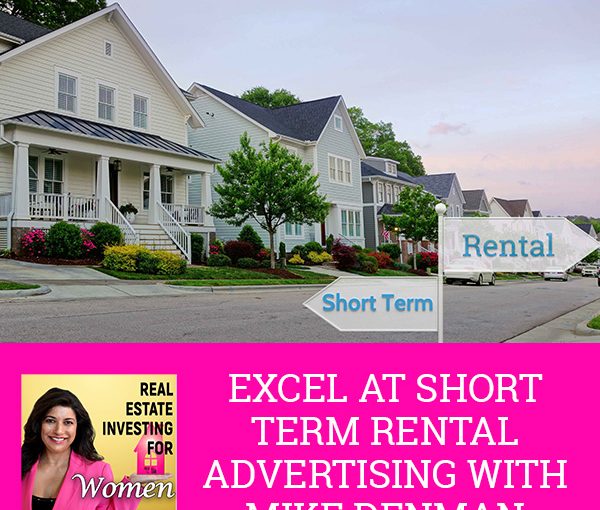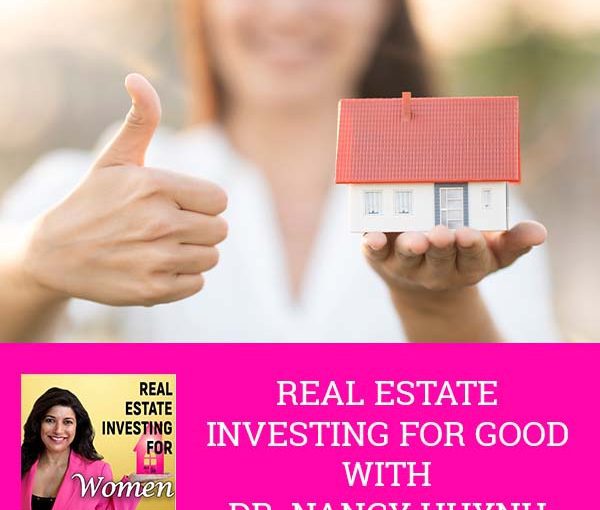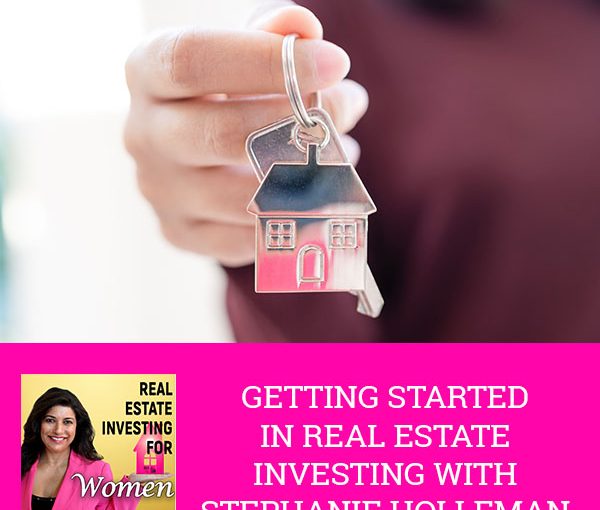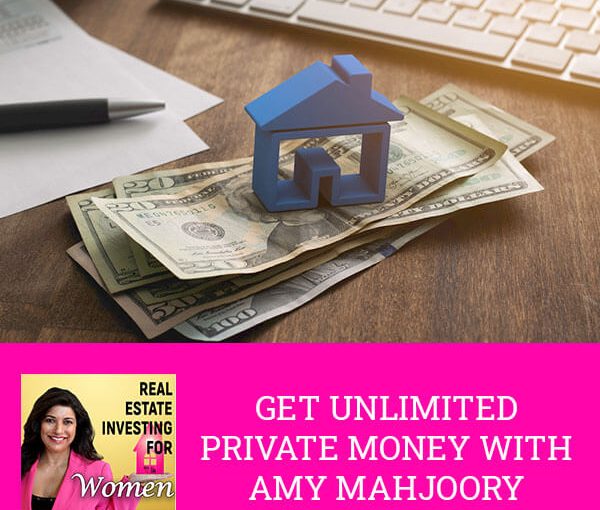Become the Bank for Passive Real Estate Income – Buy Notes
Moneeka Sawyer is often described as one of the most blissful people you will ever meet. She has been investing in Real Estate for over 20 years, so has been through all the different cycles of the market. Still, she has turned $10,000 into over $5,000,000, working only 5-10 hours per MONTH with very little stress.
While building her multi-million dollar business, she has traveled to over 55 countries, dances every single day, supports causes that are important to her, and spends lots of time with her husband of over 20 years.
She is the international best-selling author of the multiple award-winning books “Choose Bliss: The Power and Practice of Joy and Contentment” and “Real Estate Investing for Women: Expert Conversations to Increase Wealth and Happiness the Blissful Way.”
Moneeka has been featured on stages including Carnegie Hall and Nasdaq, radio, podcasts such as Achieve Your Goals with Hal Elrod, and TV stations including ABC, CBS, FOX, and the CW, impacting over 150 million people.
Excel At Short Term Rental Advertising With Mike Denman – Real Estate For Women
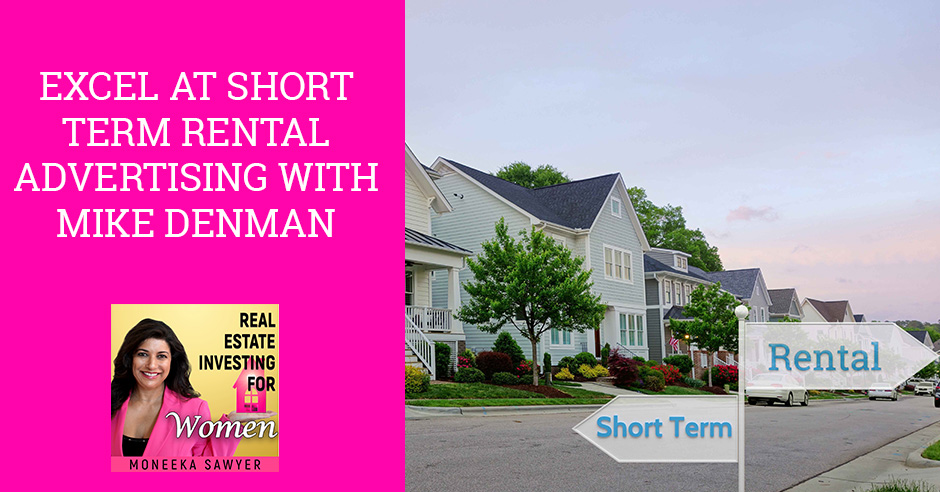
Investing in short-term rental advertising could be a game-changer for your real estate business. In this episode, Moneeka Sawyer sits with Mike Denman, CEO of Better Than Awesome, to discuss the exponential benefits of using social media ads to reach more people and get more bookings for your business. Mike shares his start in real estate and short-term rentals, sharing how he gained massive ROI by investing just a few short dollars in an advertisement. Throughout the years, Mike has observed the evolution of how ads can and should be used in social media. Listen to hear about tips and tricks on setting up a system that leaves you stress-free and income-rich. Stay tuned!
—
Watch the episode here
Listen to the podcast here
Excel At Short Term Rental Advertising With Mike Denman – Real Estate For Women
Real Estate Investing For Women
I am excited to welcome to the show, Mike Denman. Mike is an award-winning filmmaker based out of Colorado who has worked in marketing and advertising for video games since 2011 and real estate since 2015. He has been at the forefront of technological advancements in connecting people to content through the internet via apps like Instagram, Facebook, Pinterest, YouTube, and too many others to mention.
He launched STRAdvertising.com in 2022 to help educate real estate investors on the power of advertising. Adapting his real estate advertising tactics to encourage higher amounts of web traffic to short-term rental listings was possible due to his years of iterating on the process. He has been a real estate investor for a couple of years. Mike, how are you?
I’m good. Thank you for having me, Moneeka. I am very honored to be here on your show.
I’m happy to have you. Ladies, you’ve met Mike before. I played a panel that I did with Mike and Laura Powers. That’s how I met Mike. You’ve already read his great advice on real estate investing, and through that conversation, I realized he had so much more to offer you. I wanted to have them on the show. Mike, thank you for joining us again. This is going to be awesome.
I’m very excited. Honestly, after meeting a lot of these other real estate investors, I’m like, “There’s a lot of people out there. They almost know all the things and need a little bit of help and guidance to be able to see some of that success,” especially with a lot of the short-term rental investors that I work with directly. That’s where I’m buying most of the actual level of information flows that are not there. I’m like, “This has got to be something that we help people with.” I’m happy to help people learn how to do that stuff. It’s going to compete with the big boys.
You said it in the panel before but remind my audience, why did you choose short-term rentals?
This is completely not even me choosing it in the first place. My partner, Patricia, she’s an incredible real estate investor. When we first started doing real estate investing, we were renting out a room in our house and even Airbnb-ed our master bedroom to see what that would do. We were even able to get two different people to rent from us at the same time. We are sleeping in kids’ rooms with all those Schell Games moving around.
When Patricia and I started investing in property, we were doing long-term rentals. Here in Colorado, the market was challenging for rents. In 2021, we were assessing what our cashflow was. We were getting $400 a month, maybe getting out of the long-term rentals, charging thousands of dollars in rent even for these places. We are like, “Let’s make an assessment.” I did a bunch of spreadsheets mapped over many years. I was like, “If we sell it, what could we do with equity? Do we buy a bunch of long-term rentals?”
Patricia ended up reading Avery Carl’s book, Short-Term Rental, Long-Term Wealth. She was like, “I’ve got to do these short-term rental things, and this is a whole new way of approaching it,” and I was like, “That sounds great.” I didn’t even think too much about it after that. I was like, “Cool.” We started doing the whole real estate selling and getting the properties done. Through the appreciation game, we had like $250,000 to work with. We were able to 1031 exchange into some short-term rentals.
As Patricia was going through and finding different properties, she found this beach property that was in Texas in Crystal Beach that was put onto the market. Someone had looked at it. Our real estate agent is like, “You guys should check this out.” It was a gorgeous place. It was $925,000 and was on the beach. We are like, “This is crazy amounts of money.” Our own house that we live in is not even that much money. It’s valued at $660,000, but we bought it for $420,000. It was a different time. The appreciation in Colorado has been nice, so it’s been helpful.
For the short-term rental selection process, Patricia did AirDNA to see how well the prospective comparable properties are going to do in terms of how much revenue they bring in through Airbnb through Vrbo. We found this Crystal Beach property. We were like, “This is great.” We ended up getting another property that The Real Estate Robinsons or Tony Robinson was sharing on his Instagram. They had flipped a house in Joshua Tree. Patricia’s like, “Sold,” and then we ended up going and buying that house that they listed and flipped.
We bought the Real Estate Robinson’s second flip in Joshua Tree, and there was a whole bunch of stuff that we wanted to change in that. We wanted to put it in a second bathroom. We ended up launching the first short-term rental in its first place in February of 2022. The Joshua Tree one, which we soft launched in June because we had people working on it. We didn’t want to have that whole thing going.
The reason I stepped in is the whole short-term rental itself was after the first three initial short-term rental bookings, which Airbnb is like, “Twenty percent off and you can get these things,” and more people come to it. They dump about 3,000 to 5,000 people onto your listing when you first launch an Airbnb, so there’s a large exorbitant amount of people that see your listing.

Short Term Rental Advertising: They actually dump about 3,000 to 5,000 people onto your listing when you first launch an Airbnb so that way there’s a large exorbitant amount of people that see your listing and the potential statistical value of that large amount of people is that someone is gonna book those three bookings
The potential statistical value of that large amount of people is that someone is going to book those three bookings. That’s usually the statistic I use with advertising. Out of everyone I show it to, about 10% end up clicking on my links, and out of that 10%, maybe 1% to 2% of those booked save it or they will share it with their family, which I don’t even know about until after they’ve already booked. They are like, “We shared this with our family,” and then they tell me about it. There are all these anecdotal pieces of it.
Patricia came to me and was like, “We need to have bookings. We have these mortgages. What are we going to do?” I was like, “Isn’t this whole new short-term rental thing? I don’t know.” I didn’t know too much about the short-term rental ecosystems or how those even worked on the platforms like Airbnb, Vrbo, and Booking.com. I was like, “I will run some ads. It will be fine.” She’s like, “Don’t tell me you are going to run ads. This is stressful. Aren’t you taking this seriously?” I’m like, “It’s cool. I will run ads. I will spend $100 and take ten days. Let’s see if it’s viability.” I then started getting bookings. I spent $2.43 at one point, and I got a $6,000 booking.
That ROI is pretty good.
That’s pretty cool. Another time, I started running the ads, spent $4 and some change and got a $3,000 booking. I was like, “I do feel that this viability.” Some of them the ads show me that people are not interested in some of the photos I’ve used, and then I can see which photos I need to put up as the front photos. I also use ads as a market research tool for which headlines or titles work to get people to click. I try spreading that information back onto my Airbnb. It’s a cyclical piece of the puzzle. I ended up having this inform this, and then I tested it out here. I throw a bunch of things out to test it. Me, getting into the short-term rental game was because we needed to get more bookings. I was like, “I could do that.”
I have been doing real estate marketing and advertising for a while but I’ve never done short-term rentals. I started talking to other short-term rental people and was like, “People are having a hard time with bookings.” I know exactly how stressful it is not to be able to feel confident that you are going to be able to pay that several thousand dollars mortgage.” If I don’t have money coming in to pay for it, I have to pay it off my own pocket. I don’t think that I want to have that going. I put the effort into dialing in and focusing on how to help short-term rental people get those bookings.
I have been helping people. I’ve gotten over a few dozen different campaigns I have been able to run for folks getting bookings. I do a lot of other assessments of where the people are coming from so they can find where their clientele’s coming from. Through ads, you can shape and create the ways in which people are introduced to your own system. What you offer is different from other people but when you look at it on the Airbnb system where there are all these familiarities, and some of them are super similar.
Through ads you can shape and create the ways in which people are introduced to your system. Share on XFor example, people who invested in the Smokey Mountains in Tennessee. Some of those cabins look very similar. There’s not a lot of differentiation. When people are scrolling through Airbnb and looking at all this stuff, the hard part is they get analysis paralysis like, “I don’t know which one is better. They all look roughly the same. There are A-frames and all these other cabins.”
What the advertising does is it takes people from other platforms and then it puts them into your listing because they are not even seeing other listings. That’s one thing that is helpful because I’m able to charge more money per night on my listing, so I run ads. Over the summer, the highest was $379 more a night than comparable listings in my area. I’m like, “If I’m bringing people to this and those few out of 10% like my place and the 1% or 2% book, I’m getting my rates. If people don’t book with me and are looking around in that local area, then they are booking with my neighbors.” I have an indirect benefit to the area that I’m advertising to because the person to who I showed the ad to didn’t meet my criteria. They still are looking now for a vacation when they hadn’t even thought about vacation beforehand.
It all started with this whole need, and then it ended up being something. I was like, “This is a viable thing.” That’s when I started the business. I was like, “This is going to be something that I can have, and I help.” It’s not even my main thing but now I’m starting to do it more and more. I feel like it’s more fun and exciting because I like helping people, especially helping them make money. That the blissful side of things is when you have those systems in place, and they are working and doing what they are supposed to do so that way, you are not stressed out. Watching Patricia go through some of the stressful moments and I’m all casual, “No worries.”

Short Term Rental Advertising: When you have those systems in place and working, they’re just doing what they’re supposed to do so that you’re not stressed out.
That probably drove her crazy.
I felt bad. I was like, “I’m not trying to be all like hunky dory about it. I will run the ad. It’s what I do.”
It’s funny that you talk about putting in the systems to make it less stressful. I’ve said on this show before that systems are the key to bliss because when you have a system done or processes, you know that things are going to be handled. You don’t have to reinvent the wheel. You can hand it off to a VA if you so choose or to somebody else to help you. You also have a pretty good idea of what your results are going to be like. Certainly, you have to revisit the systems and results like things that are constantly changing and expanding but I have said many times that it’s a system and process that creates the bliss because it reduces your stress exponentially.
It does. When we feel the stress of paying our own mortgages sometimes, and even though we work and have jobs, we have the money, and it goes in, that’s the system. The job is the system to then facilitate the housing. All these things are already built into our own ecosystems. On the investing side, it is how you make investing work for you. You listen to the experts and take a lot of information in but those systems are all in the same thing.
You build out your Airbnb, Vrbo, and Booking.com. You then have an OwnerREz that connects to those that create one calendar so that way everyone is not double-booking a calendar piece. Having a double-book weekend is expensive, and it can take away your Superhost status if you end up canceling things. There are challenges that you want to avoid. Those systems create the ease of operating that way so you can do far less and enjoy life more. You then can see, “I’m getting far more than I would through my stocks.” It’s different.
Real estate is the number one way to increase wealth in America. If you want to increase it and succeed, you got to do something. I always think back to the Pareto Principle, the 80/20 Rule. Eighty percent of businesses fail in the first two years. These investment properties, when you look at them, they are little mini businesses. If you don’t treat them like a business, you are not going to see their success of it. It’s going to be stressful, and you are going to be one of that 80% that fail. The statistic I saw from BiggerPockets was that over 60% of Airbnb owners sell their Airbnbs within the first year of doing business or something like that.
That’s an interesting statistic.
Patricia will say this all the time, “It’s not for everybody,” and I can account for that. It is a job, and it is being hospitable. If you are not good with people and hire someone that is good with people. You have to have that system or whatever your faults are and ailments in terms of dealing with the hospitality side of things as we go to town on towels. We have more towels than reasonably possible in our short-term rentals. We’ve gotten many people who are like, “I want to leave a ten-star review because of the number of towels you guys had.
At this moment, we are like, “When we go into this short-term rental stuff, how do we want our vacations to appear, and how blissful would it be if this was available for other people?” That’s why we stock that many towels. With hair and all those things, sometimes you need multiple towels to do stuff. If you’ve got kids, you get all these wranglings. There’s a whole bunch of stuff. You can’t have like one towel to use. You must think about how you want to be perceived, especially as a business owner and a hospitality provider.
What makes your property special? That’s all marketing. I used to run Airbnb too out of one of my bedrooms. We used to rent a couple of bedrooms. That was one of the things that we did. People loved the towels. We always had fun towels. I had Polka Dots or Paisleys, and they were plush. People love the towels. It was the weirdest thing. I was like, “What is this?” They are like, “Where did you get these?” It’s so funny. You said you do Airbnb and Vrbo, and what was the calendaring system that you used?
It’s called OwnerRez.com. It’s Owner Reservation. That is our main connecting piece. It does the automation between the different short-term rental platforms. For pricing, calendar, availability, images, text, and all of those elements, you can change on those individual platforms but it takes time and effort. You can even pay OwnerRez for $500 or something like that, and they set all the stuff up for you.
There are emails that come out of their automated emails when you have a lease agreement you need to be signed and all these different things. There are cool features in that. If you pay a little bit more monthly, there’s a direct booking site, so you don’t have to pay half a separate website built out there. For direct booking sites, it’s a formidable experience doing it.
You are literally becoming the hotel. That’s all the liability and scariness of that. There are things that you have to pay attention to for direct booking, which is why I’m like, “I send most of my traffic to Airbnb now.” When I send traffic to Airbnb, I’m inorganically increasing the traffic flow to that listing view page. By increasing the views of that, I’m telling Airbnb’s search algorithm, “This is a popular property.”
It will put it on the top.
It raises in rank and makes you successful in terms of both organic searches as well as your ad searches. That way, the ads are influencing the ability of Airbnb to see you as a viable property. Since Airbnb changed things in the summer of 2022, it’s crucial to have some ways in which you can stand out on the Airbnb platform. What Airbnb wants now is unique places with very strange experiences. They want to promote all those things more so than the run-of-the-mill places that are perfectly reasonable to vacation in. Each of the systems is a different ecosystem. There’s a whole different Oprah episode that we can go into those things.
Airbnb changed things in the summer of 2022, and it's really crucial to have some sort of way in which you can stand out on the Airbnb platform. Share on XI don’t think that the Vrbo clientele leaves reviews quickly enough, so I don’t even push my Vrbo. Although, we get 30% of our bookings from Vrbo for the Crystal Beach property. I don’t get any of those bookings from my Joshua Tree property. There’s a difference in the type of person who’s using those things. Airbnb is almost like Kleenex in terms of brand recognition for the short-term rental game itself.
As investors, when we are going through it, we want to be in all of them. Whatever one you are on, you are going to have an opportunity for people to find you. In the Venn Diagram of the internet, there are all these people that go to certain sites or all of them. That’s a way in which you can stand out by standing up for all of them.
I want to start digging into the actual advertising piece. First of all, thank you for the algorithm update because I was not aware of that. As with everything else, whether it’s Amazon, Google, Facebook or whatever, everybody is updating their algorithms, and they have a definite slant on how things are going. I wasn’t aware of that update. Thank you so much for that.
It was a massive one. They call it the summer release. It was detrimental. I couldn’t even find my property listed on Airbnb after that. For their beachfront or ocean view category, they didn’t show my property at all. There are all these other things about those systems not working to their full effect of what they should do when they make those changes. Doing ads is what I have been succeeding at. I don’t even need to worry about being on that platform as much. The location is now findable but in those moments, it’s a little freaky when my name just dropped off.
I’ve had that happen too. I was a Superhost, and my property was always in the top three, and then suddenly, it disappeared. I was like, “What happened here?” It was interesting. Anyway, so let’s talk about advertising since that’s your genius. Talk to us about creating a digital presence to compete effectively. You’ve talked a little bit about it already on a high level but give us a little bit more on what to do.
I published a little book, and it’s very tiny and thin. It’s only 37 pages. I made a quick little guide on how to excel at short-term rental advertising. When you think about the digital presence and what people succeed at like “Where are people hanging out online?” We have a few different areas where people are online. Meta has Facebook and Instagram, and some other different websites that are all in that circle and sphere.

Short Term Rental Advertising: How to Excel at Short Term Rental: Advertising – www.stradvertising.com/monika
You have other ones like Pinterest, YouTube, and TikTok. TikTok is a great landscape because many people are on TikTok now. It’s excessive amounts of people. I have a friend doing syndication stuff as well. He’s going to start doing content on TikTok, teaching people about how to do syndications, where you all pull money in, and you can buy a property together. There are a lot of different avenues with that. They are also being used for NFTs, the Non-Fungible Tokens. Those are other areas that I have been helping people with as well. Not just with the advertising.
For the ad systems, you can operate on ecosystems like Meta, which is what I like to use for a lot of the short-term rental or real estate investing stuff, in general. With Meta Ads, I can literally create an advertisement that has an image or video. I usually choose up to 10 images or videos for 1 ad campaign. I then have five different pieces of text. I like using people’s reviews.
Whenever someone stays at your property, if you have a short-term rental or an investment property that is like commercial property or something else, you have some statement of actual patron or a customer of that and they are like, “I love this. This is amazing. I love staying here.” People trust what other people are saying more than what we are telling them as the actual owners. It’s not necessarily like, “Come visit my thing. It’s the best,” but it’s like, “See what people are saying about this,” and then you make your decision based on that. That helps people make those eccentric.
People trust what other people are saying more than what we're telling them as the actual owners. Share on XYou run ads with a bunch of different combinations of text and little calls to action and create those little moments to use that digital presence to then tell people about it. Oftentimes people will say, “You have to be active on social media and all these things.” I’m like, “I don’t have a lot of time, and I’m not very active on some things.” I know the viability of being active on a social media platform like Facebook if I have a business page. If I post a bunch of things there every single day, I can’t even promise I would get much action or activity out of any of those posts.
People are oftentimes like, “I don’t see the viability of it,” but if you run ads, your posts are getting to people instead of them having to find it through all the different things. Facebook from 2018 is when they made the change. The first thing you see is events in groups. The things your friends are doing, the groups that you are in, and people are talking about stuff that you care about. You then see your friends’ stuff, and then below, all the way at the bottom, you see business pages.
Those business pages, that’s the viable thing that used to be what worked and tell people about stuff. I now post a few things on there and treat it like a digital billboard. Ultimately, I have enough information and photos on that Facebook Meta page where people then say, “This is what this is.” If it’s a short-term rental, they see where it is, the photos of it, some of the things to do in the area, and also the link to go book.
I use ads to tell people about the booking page. I literally don’t point them to the Facebook page. I tell them about the link. They see the Facebook page in the ad so that they can click on it. This is funny because I use a lot of different KPIs or Key Performance Indicators to see whether or not these ads are working. From the Facebook side of it, it’s the number of clicks I have on the ad is one thing but then the number of shares, interactions, responses, reactions, loves, hearts, all those little things, engagement with people talking about it, commenting, telling their friends, and tagging them in it. There’s all this activity that happens, and it’s lovely.
When people save the posts, I’m like, “This is golden,” because someone saved it. They might not be a client of mine now but they are probably going to book at some point. If they are aware of it and since they clicked on my ad, I can target the people who’ve clicked on my ads. I can say, “Remember the ad you clicked on. You should totally take a vacation. You deserve it. You are amazing.”
When you have those moments, these ads are doing all the posts for you. You could set up an ad campaign. All the different combinations of modular like texts, images, video, and all those things Facebook’s algorithm will put together for you. It will find the most performing, the most clickable, the most liked, the most effective, and a combination of all those things. With that, you can see a lot of cool data. You can start seeing, “What are people interested in?”

Short Term Rental Advertising: These ads are just really doing all the posts for you.
When I was starting with my Crystal Beach place, I was like, “This is a luxury place. It’s got vaulted ceilings. It’s great. This is better than anything I’ve ever lived in myself.” When I started using luxury or things I would normally do for luxury real estate, people weren’t clicking on it. When I used family-friendly or fun for the whole family, people clicked on those things in droves. I was like, “I see who my clients are.” They are people who have kids and families that are bringing people together. Ultimately, those little friendship circles are also a part of that too so it’s not families.
Those are popular keywords that I then put into my listing titles. That way, I’m like, “This triggers more people to click on this. If I update my listing, it’s going to then match what my ad said.” The ads inform what I put onto my listing itself, and the top photos go to the forefront of those listings. On my Instagram page we don’t have much activity in terms of us posting on some of our Instagram pages.
Our Joshua Tree property, that LA, San Diego, and Las Vegas crowd who usually rents in Joshua Tree use Instagram more. That’s something that we organically post on Instagram for those ecosystems to work a little bit more. I don’t see the viability of it quite yet but it’s nice to have some of those things working out.
Those markets for the Joshua Tree property like Instagram. How did you figure that out as opposed to Facebook?
When Facebook runs any of the ads, it’s going to send them out to Instagram and Facebook. It has all of those arranged. With Instagram, I saw the clicks were far less. I spent money straight up on Instagram $100, to see the viability of it. Out of that $100 spent, I didn’t get any results in terms of bookings. That made me feel that it wasn’t necessarily a viable source for new bookings from those ads. That’s something that might change. There’s an ebb and flow to things.
I’ve even started doing ads on Pinterest, and I can talk about that a little later but there are ways in which you can reach the audience that you are trying to reach. There are mechanisms that they are paying attention to online. You even mentioned TikTok. There are a lot of people on TikTok but I’m not necessarily sure how many people are going to be booking vacation rentals or even doing real estate investing. It’s the demographic of who is booking. When they are clicking on your ads, those things all come into factor.
The demographic who is actually booking and when they're clicking on your ads, those things all really come into factor. Share on XI put a lot of effort into Facebook for a while, the beginning parts of my business. It’s not for real estate but more for real estate investing for women and bringing women together and the community. What’s interesting is that the level of effort that it took to try to get things moving was so massive. It’s not my expertise, and it became such a chore for me. It was not fun. I was spending too much time there, as you said. We are all busy.
You put in time and energy, and you want to see some results if you are going to continue. I found that with Facebook, I was not getting the results that were helping my ladies. On Instagram, I spent a lot of time on Instagram but I don’t post a lot anymore because, for a huge amount of time, I wasn’t getting any following or whatever. I’m a little bit of a social media fail, which I’m okay with. I decided it’s okay to be a social media fail. It’s interesting to me that you are talking so much about ads, and you don’t have to be active on social media and still, doing the ads is effective.
You are not a failure on this stuff. All of the efforts that you put in, even though you don’t see the value, still have some value to someone out there. When those people find you and go back through your past posts, they are like, “I get a sense of this,” as more of a rapport with you because you do that stuff. That heavy lifting up front is viable.
For ads, you can set this up. Facebook figures it out. It’s probably going to deliver over 3,500 different ads. When you think about the thousands of advertisements that are going out there and people being shown based on their interests and demographic area, sometimes I will target one city or different cities. I rarely target the whole United States.
I will go in and find specific areas where there are certain investors, people looking for certain properties or different things of that nature. I will find where the guests are based on a large blanket area and set the ads. I then see where the clicks are coming from as specific cities. I drill in and only advertise to those cities. I try to make it that way.
I’m learning stuff with the ads. Even with Facebook itself, if you have some posts that have bigger interests or video posts, there are some things you can test out on social media without running them as ads. I like to run them as ads to test them out before I put them on social media. You can do both but it informs me of the other.
One of the best things now is that the videos are portrait-size. Those videos are more converting for Facebook’s own statistical analysis of how people are interacting with content. I usually talk to Facebook’s ad support team a couple of times a week. This summer, they have been promoting Reels. The most effective ads now are the fifteen-second ads that go between Reels. They are fifteen-second ads like a video, portrait size with your phone and film it is saying what you do and where you are at. Even if you are an investor trying to get other investors to pull money for a syndicate, there are different mechanisms that you can do to tell people about what you are doing.
That’s the number one thing about real estate stuff. No matter what real estate thing you are doing, you talk about it. If you talk about it, you don’t know who else might be interested in it, who else might be doing something in that or who else might be interested in investing money with you that you can use their money to do things with.

Short Term Rental Advertising: That’s the number one thing about real estate stuff. No matter what real estate thing you’re doing, you talk about it. You don’t know who else might be interested in it or might be doing something in that, or might be interested in just investing money with you that you can use to do things with.
There are all these different options that are viable ways of making money that you don’t even have to be doing all the hard work. For those people who are doing that syndication thing, there are beautiful opportunities. For the people doing short-term rental stuff, there are amazing opportunities for people to be reminded of taking vacations. You are like, “I provide this luxury experience for people who have vacations.” There are all these people doing amazing things with their own properties. They have galactic game rooms, the Patrick Swayze room down in the Palm Springs area. He’s with STR Nation.
There are all these different companies that are building themselves out by designing the different experiences of what makes a cool vacation. Now that we are all thinking about it, we spent some pandemic times not going anywhere and going to some of these places, and the viability of some of the short-term rentals went up during that pandemic because a lot of hotels closed but now hotels have been doing smear campaigns. They are like anti-Airbnb and other short-term rentals. They are like, “They are spooky, and you have to take out the garbage yourself and all these things.” They will say the worst-case scenarios.
I’ve seen some people who have minimum night stays that have not seen much results from advertising. If your property is not viable for whatever variable the person needs to have like calendar availability, location or the number of beds you have. I can’t guarantee that there will be bookings with any of the ads I do but we can try and find out. Also, the added benefit of not having to run your own social media makes it easier, and you have something running.
In advertising, I spend $10 a day for each of my properties. It’s $300 a month for a property. If I run people’s ads, I usually charge them 1-to-1 based on what that is usually of the ad spent. For the most part, I’ve spent $700 a month on advertising. I’m like, “I got X amount of money in bookings by telling more people about it.” It’s a justifiable cost for me. When I think about the time I save by not having to post a bunch to get people to even pay attention to it, I had all that time to spend with my three-year-old daughter, which is far more important for me to ensure that I’m paying attention to her than worrying about posting on my Instagram and Facebook pages.
You said something that I want to go back to. It’s the vertical video. Are people posting them in their Reels and lives or are they posting them in their groups? How are they doing that?
When they post them live, it goes onto stories. That’s a viable solution for those. When they post them, even as a story on Facebook or Instagram, it does different things. You can take the same video and post it to Facebook Stories, Instagram Stories, TikTok, and YouTube. There are all these different places you can put that same video. That same video could act as a trend rolling. I like YouTube for a lot of this stuff as well.
I don’t know the viability of what people are booking for on YouTube but if you are looking for other real estate people or doing investing, there is a lot of information on YouTube. They are making YouTube Shorts, which are essentially the same thing as the Stories on Facebook or Instagram. Snapchat is where that all originated from but that’s not a viable ecosystem for this. This is good for video games.
TikTok is where everyone is now. Even if, as investors, they are like, “I’m going to try that out.” TikTok has an advertising opportunity. You create an ad account, pay them per view, and you have to submit a whole video. It’s usually a pretty simple process but I have been doing ads for so long online. It’s not easy for a lot of people. Even setting up Facebook ads takes some effort to get some things going because it is a tricky regulated system. Sometimes you have to submit your business information to be verified. That way, you can advertise. Facebook is getting touchy about things, especially if it’s around any political season about ad accounts in general and what you are advertising. It’s crucial.
Is a Story the same as a Reel?
No, but it goes in the same spot. A Reel is a minute or longer video that lives in the Stories environment. Story environments like Facebook Stories and even Instagram separated out Reels into their own section now. It’s still being put into the regular post areas. Everything with these platforms changes. It always adapts to new things. If someone has a cool new product idea, they are like, “Let’s do that everywhere.”
There was a whole Clubhouse thing that came out while we were all at home during the pandemic. Everyone is talking and having voice chats. All of the platforms started having that thing as well. The hot thing now is Reels. If it’s a minute-long version of a video that’s shot in that 9X16 format, that is all that you need to do. If you are not doing those Reels, you can post a little bit.
If you don’t want to post those Reels and have it done through ads, you make the ad that’s a 9X16 video and then submit it up to be included as a Reel, and then all of those will show up. This leaves you not having to worry about doing it and not doing a lot of them. You can have one doing most of the work for you. It takes a lot of that stress of having to create a lot of content.
My partner, Patricia, was getting stressed. She’s like, “I have to make content and all this stuff.” I was like, “It’s okay. Make 1 or 2 that you like, maybe even 5.” I’m a big fan of testing. I like to spaghetti test everything. If I’m going to throw a bunch of stuff at a wall, then I’m going to see, “The 2 or 3 things worked well, and I’m going to keep doing those things.”
If you iterate on the process and make it even better each time, I can’t guarantee that it will always be the same thing that works well. After people work with me, I’ve got at least a good idea that I can flip a switch on, and then all of a sudden, they have ads running and a bunch of traffic going to their listing. If the listing has things on it that make people want to book it, then great but if they have anything on it barely, they have low information, low images, and bad images, we can find out pretty quickly if that’s a viable listing.
Throw a bunch of stuff at a wall, then see the two or three things that worked really well and keep doing those things. If you iterate on the process and make it so that it's even better each time. Share on XI’ve worked with a couple of guys over the course of running ads. They determined that it was the property they needed to sell. They were able to find out quickly instead of having months and months of mortgage costs and ultimately draining some of the reserves. They can find out, “This is not a viable product,” or maybe they need to do a different type of investing. Maybe it’s long-term or midterm.
I love the midterm investing stuff, especially because of the traveling nurse mentality. There are many resources that those people have that we, as investors, provide. I know several investors that only invest within 500 feet to 1,000 feet away from hospital access. They have patients as well as nurses who do traveling nurse stuff and stay for more than 30 to whatever timeframe. It’s usually pretty decent money for that thing. It’s not some of the short-term rental money but you can get three times the actual cost of the mortgage and rent.
As an investor, you must figure out, “Which one of these areas you want to do it in.” I’m still a big fan of long-term rentals. We have 4 doors in Iowa, and they are 2 duplexes. Patricia went out to Iowa to close on one of the properties. I had a buddy who moved out there. She’s like, “You got to invest in Dubuque, Iowa.” We are like, “Dubuque, Iowa. That’s weird.”
We have two of these like little duplexes that rent $1,500 a month without having to do much. That’s just cashflow. When we started our journey, we had $400 a month cashflow. We are like, “This is tricky.” We are able to get a second job’s income on a monthly basis coming through moving some of that money to long-term rental. That ecosystem is a little bit different, and I don’t do advertising too much for that. We only do ads when we are placing people in there, which is 9 to 12 months at the time. It’s not too crazy.
It could go on forever. We didn’t get to do our three rapid-fire questions or anything. I always have to make that judgment call on myself about, “Do we move this along or do we go with the flow?” In your case, what I’m finding is there’s so much knowledge in your head, and you speak in this stream of consciousness, so we get all these jewels that came out. Those were off-topic but amazing. Thank you for that. Ladies, I hope that that was okay with you. Every time I would like to say, “Let’s get to this next question,” then he would say something, and I was like, “What?” and I would lean in. I hope you ladies had that same experience.
Before we sign off, we are going to talk about Pinterest. Mike has had a lot of experience as he’s talked with Facebook, YouTube, and Instagram but he started working on Pinterest. I wanted him to share with you that experience because we’ve never had anybody talk about that on this show. We are going to be doing that in EXTRA. Stay tuned for that. Mike, could you tell the ladies how they can reach you?
You can reach me at STRAdvertising.com. I’m pretty active on Facebook. I have a Facebook group, Short Term Rental Marketing Advice (Powered by BTA) Better Than Awesome is my main umbrella company. I’m happy to provide help. I have a lot of free resources. In fact, I normally charge for this but I’m going to give your audience a copy of my eBook on how to excel in short-term rental advertising. It’s a quick and dirty little walkthrough on how to do this with my processes, how to iterate on things, and a lot of my methodology. I talk about my own experience of getting into real estate stuff but it’s very short. It’s 37 pages, and there are lots of pictures.
Essentially, it’s a quick, easy start guide to get you into it. I have a little extra bonus in there. It’s a digital presence quick start guide that tells people, “Once you are over quick and dirty. This is the platforms you should get onto. This is how the ad is set up. This is a demographic you want to look at,” but I will be able to send that to everyone that has an eBook offer. We will make sure we have a link for you guys.
That’s STRAdvertising.com/moneeka. Thank you so much for giving my ladies that book. I know it’s out there, and it’s normally $9.99. It’s so sweet that you are giving it to my ladies. Thank you for that, Mike.
You are incredible, and I love what you are doing here. My mom raised me right. I’m trying to be a good ally. One of the most deserving populaces to be able to have better information and compete at the higher levels, as I said earlier, even the big boys club, that nomenclature is totally inappropriate. Let’s make that into something where it’s the big players club where it is something that people don’t have an association of gender with it. It’s very important that, as a cis White man, I use whatever privilege I can to impart some benefit to people who are not in the weird privileged state that I am by societal inheritance.
I don’t do much to earn some of the things that people inherently give me as I walk into the room but what I do have and gained from that I can impart with some pretty solid wisdom that’s actionable and can help make money. I genuinely feel pretty confident. Everyone that I’ve worked with teaches how to do this or even uses the book to do it. They are all very pleased with how short and concise it is, and it’s not a bunch of BS.
Thirty-seven pages are awesome. I wrote a 37-page book also. You have to get good at making your point. It’s hard but it’s good for the reader.
I started making TV commercials as one of my first video jobs. That highly complex thing into a short-distilled conversation piece is what I’ve specialized in.
Thank you so much for all that you’ve offered at this portion of the show. I can’t wait to talk in EXTRA about Pinterest.
Thank you so much for having me again. I appreciate everyone. If you guys have questions, feel free to reach out. My group has a lot of great people, and I have been helping with as well. They all have a good insight into their own stuff. I like information sharing, so let’s get everyone in there. I have been banned from other groups on Facebook for sharing free information. There’s a thing out there, and people are not interested in what I’m doing because it’s working and competing with what they have. That’s unfortunate but everyone deserves to compete at some of those higher levels without having too much.
Thank you. Ladies, stay tuned. We’ve got more. We are going to be talking about Pinterest in EXTRA, so if you are subscribed, stay tuned. If you are not but would like to be, go to RealEstateInvestingForWomenEXTRA.com, and you can subscribe there. For those of you that are leaving us now, thank you so much for spending this time with Mike and I. I look forward to seeing you next time. Until then, remember, goals without action are just dreams. Get out there, take action, and create the life your heart deeply desires. I will see you soon.
Important Links
- Mike Denman
- STRAdvertising.com
- Short-Term Rental, Long-Term Wealth
- Booking.com
- OwnerREz
- Short Term Rental Marketing Advice (Powered by BTA)
- STRAdvertising.com/moneeka
- RealEstateInvestingForWomenEXTRA.com
Get Dr. Shaler’s free EBook: “How to Spot a Hijackal” at https://www.forrelationshiphelp.com/help-handling-hijackals-spot-signup/
To listen to the EXTRA portion of this show go to RealEstateInvestingForWomenExtra.com
——————————————————
Learn how to create a consistent income stream by only working 5 hours a month the Blissful Investor Way.
Grab my FREE guide at http://www.BlissfulInvestor.com
Moneeka Sawyer is often described as one of the most blissful people you will ever meet. She has been investing in Real Estate for over 20 years, so has been through all the different cycles of the market. Still, she has turned $10,000 into over $5,000,000, working only 5-10 hours per MONTH with very little stress.
While building her multi-million dollar business, she has traveled to over 55 countries, dances every single day, supports causes that are important to her, and spends lots of time with her husband of over 20 years.
She is the international best-selling author of the multiple award-winning books “Choose Bliss: The Power and Practice of Joy and Contentment” and “Real Estate Investing for Women: Expert Conversations to Increase Wealth and Happiness the Blissful Way.”
Moneeka has been featured on stages including Carnegie Hall and Nasdaq, radio, podcasts such as Achieve Your Goals with Hal Elrod, and TV stations including ABC, CBS, FOX, and the CW, impacting over 150 million people.
Real Estate Investing For Good With Dr. Nancy Huynh – Real Estate Women
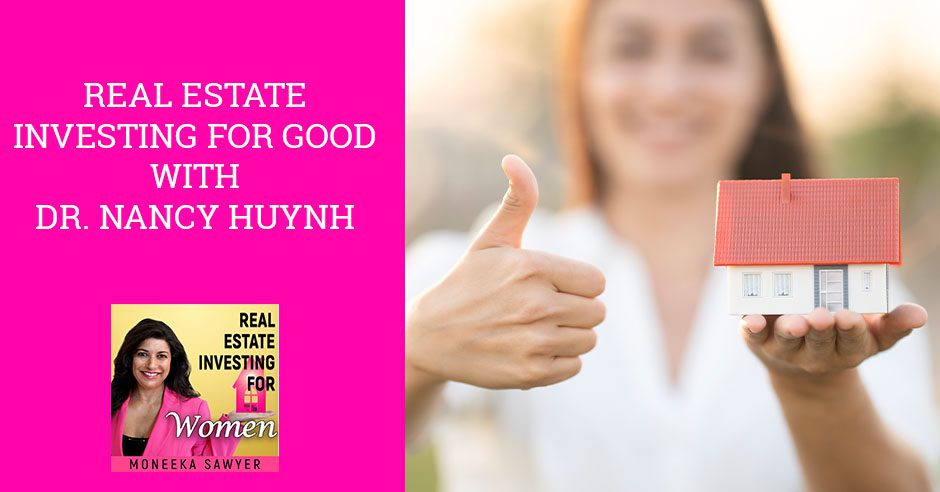
Many investors are in real estate as a side hustle and to create passive income. But how do you know when it is time to finally start settling in the industry for good, taking a more active role in achieving financial freedom? Eye surgeon and impact real estate investor Nancy Huynh, MD, helps us answer this question as she joins Moneeka Sawyer in this episode. Nancy founded Clear Vision Investing to help others, especially physicians, realize the power of real estate and achieve financial security. She tells us how she does that while sharing her own journey to investing and getting in syndications. Extending her success to others, Nancy then discusses investing for impact. She talks about her mission with real estate to help cure preventable blindness globally. Follow along with this impactful conversation to learn how you can achieve financial freedom and help others at the same time.
—
Watch the episode here
Listen to the podcast here
Real Estate Investing For Good With Dr. Nancy Huynh – Real Estate Women
Real Estate Investing For Women
I am so excited to welcome to the show, Nancy Huynh. Nancy is a Physician, an Eye Surgeon and Impact Real Estate Investor. She started investing in real estate to create passive income, hoping to regain control of her time and stop trading time for money. She founded Clear Vision Investing not only to grow her own portfolio but also to help others realize the power of real estate. She’s passionate about helping others, especially physicians, gain financial literacy and achieve financial security through real estate investing.
She believes that financially intelligent physicians can change medicine and the world for the better. As an impact investor, Nancy believes that real estate investing can deliver attractive financial returns while also making a positive social impact. I believe that too. Part of the profits from her company is donated to giving the gift of sight to someone in need and to cure preventable blindness globally. Nancy, that sent shivers down my spine and all over. What a beautiful bio and a beautiful mission. Welcome to the show.
Thank you so much for having me. I’m so excited to be here with you.
It’s so funny, Nancy. We think of doctors as rich and smart. Many people think of them as pompous. They think they know everything. My mom’s a physician, so you know, I know the way the world perceives. We need our doctors and there are all these opinions. What’s so interesting is we never think of a physician as needing financial literacy. I know from personal experience because my mom is a physician, so we hung out with a lot of them. They make a lot of money. They also have this huge social expectation to live up to. They spend so much of that time, first of all, serving their patients but then also feel it because they’re of service. They come to the world of service.
That’s what physicians do. They also feel that they have to live up to the expectations of how people see them. They put so much more importance outwardly. They don’t have the financial of literacy to create a life that then can be bigger than themselves. It’s so awesome. We’ve had one other doctor that’s doing a very similar thing on the show. I love what you’re doing for these people that serve us, serve their communities. They go through this huge education. They go through their residencies.
They sacrifice so much to be able to be of service then their lives get so tied up that they never get to retire or never get to get the freedom of time with their children and their families and the things that are important to them. Good job. To expand it to something even bigger than that, to be even bigger service to the community in different ways. Thank you for that.
Thank you for that perspective. You hit it right on point. Physicians were so used to sacrifice. Sacrificing our twenties and often our early thirties or even later, sometimes many years to get into this profession and become that attending physician. Through that process, we also financially accumulate a lot of debt. A lot of us graduate with over six figures of student loans from college and med school. When you’re in residency, you’re earning less than minimum wage for the amount of hours that you work. You start off with this negative net worth and all of a sudden, as you said, society expects you to live up to this expectation of this doctor image, the big house, the cars, the private schools.
People often get caught in the cycle of where they’re working and they’re making good money, but they’re chasing a hamster wheel. They never, as you said, experience that financial freedom but also that time freedom and, eventually, that geographic freedom, freedom of relationships and freedom of purpose to do what you want to do.
It’s so sad. This is true in many professions. Not just with physicians. I’ve seen it with vets, with dentists, in all different professions, whether it’s healthcare or not, where people sacrifice so much and end up in a place where they don’t get the freedoms that will make their life blissful. It’s amazing. Tell us a little bit about your journey, like how did you get from being physician to real estate investor? The two-minute high level, how did you get here?
Briefly, I’m a child of refugees. My parents came here after the Vietnam War in 1980. I was the first in my family to be born in the US. Unlike many children from immigrant families, were taught, “Study hard. Go to school and get good grades. Go to a good college and get that good job.” I followed this very prescribed path and along the way, I fell in love with medicine. That’s what I did. I went through medical school and fell in love with eye and ophthalmology and eye surgeries and giving the gift of sight. After I got off that training, I started working.
This is what got me. I realized, “I’m making pretty good money,” but the one thing I could never make back was my time, the one non-renewable resource. I could never get back and this especially hit home. I already had this feeling, but this especially hit home when my daughter was born. I remember she had a 103-degree fever and I had gone back to work after maternity leave. She was probably three or four months old.
The nanny called me and was like, “Can you come home? I’m not sure what to do.” I remember looking at my clinic schedule and I was like, “I cannot because I can’t cancel on these patients. I’ll be home as soon as possible.” I remember that feeling I was serving everyone but the one thing that I want to do now, which was to be with my daughter to figure out what was going on. I couldn’t do it because I didn’t have that time freedom. That time, I realized, was more valuable than anything. That’s when I thought to see what I could do. I discovered this thing called passive income and through that, I discovered real estate. That’s when I was off to the races with real estate.
What you talk about is that passive income creates optionality and choices. I don’t know if you’ve ever seen my TEDx Talk, but it’s all about choice creates happiness. Choice gives you time freedom. Choice gives you the relationships that you want. I love your perspective on that. Could you talk a little bit about that?
Money can’t buy happiness in and of itself but advise you that optionality, as we’re talking about. Once you take that financial burden off of you, you’re a little freer to say, “Now I don’t need to trade my time to earn this paycheck, to pay the bills, to pay the mortgage. What do I do with that time?” Sometimes it means I want to work more. I want to be more patient. I want to do more surgeries, but the freedom of saying it’s my choice to do that is different than saying, “I have to do it.”

Real Estate Investing: The freedom of saying “it’s my choice to do that” is different from saying “I have to do it.”
I think that’s the key distinction that I want your readers to know. It’s different when you’re doing something, but you feel like you have to do it versus, I’m choosing to do it. It might be the same thing, for instance. I could do twenty cataract cases, but it’s one thing to say, “I have to do it because I have to earn this amount of money to cover these expenses.” Versus, “I choose to do it because I love it. I want to help these patients.” It brings a completely different viewpoint and it’s so freeing.
It also helps to shift your identity. I’ve got a similar story. My husband and I were trying to get pregnant. We were going through the fertility thing and I had had eleven miscarriages and we were on our 12th pregnancy. I remember one morning. I went to my doctor to do my ultrasound and we lost the heartbeat that morning. I remember bawling in the little white room that I was sitting there. The doctor left to give me a moment. I cried and cried. I called my husband and I said, “We lost the heartbeat. I need you.” It was about 11:00 and he said, “Sweetheart, I’ve got meetings all day. I’ll be home at 4:00.”
He wanted to be there with me and I knew that. It wasn’t his fault, but I think for him, he also realized, “I want to be able to be a yes. My identity as a software programmer is not as important as my identity as husband to Moneeka.” It was an interesting shift from being professional, this is how I identify myself and this is my value to, I want to be a choice for this. I want to be a programmer because it’s fun. That’s when he got involved. He’s still not hugely involved in my business but got his buy-in.
We need to create enough passive income so that if you decide that you don’t want to be a programmer anymore, you don’t want to be tied up to a job, now you can do that. When you’re doing it, it’s because you love it, you’re passionate about it, not because you have to. It’s this idea of creating the passive income to become job optional. Not necessarily retire. I say retire and all my stuff because it’s an easier way to say. It sounds better than job optional, but what we’re going for is being able to create the bliss in your life that you’re searching for. That may be continuing to work.
I think for a lot of us, it’s going to involve some work. Whether it be, “I want to stay home more with my kids.” Being a mom is a lot of work. I have two young children so that in itself is work. You get to choose, as you said, what your identity, what title you want to choose and it could be fluid, but then it becomes your choice. Instead of saying, “I have to be changed to this 9:00 to 5:00 at this desk because my employer told me I have to. I have to get that every two-week paycheck. I have to be this identity from Monday to Friday from 9:00 to 5:00.”
What if you have those options with passive income to say, “Monday and Tuesday, I want to be a doctor. I want to be a surgeon. Wednesday, Thursday and Friday, I want to be a mom or I want to be a real estate investor or whatever you want to do.” It gives you a lot more choices. The flexibility of having options is what frees the mind. I think when people get stuck and feeling like they’re “trap” is when they don’t have options. If you have ten options, even whatever problem you’re solving, it doesn’t seem like a problem anymore, then it’s very freeing.
The flexibility of having options is what frees the mind. Share on XIt may feel like a challenge, but you have more confidence. You have more emotional and mental and creative confidence that you can get through it, get to the other side of it. Do you think anybody can invest in real estate?
I do.
Tell me about that.
I knew nothing about real estate other than buying a primary home. There’s so much out there now, so much education. Maybe it was different years ago. I don’t know. I didn’t look way back, but I’m sure if there’s a will, there’s a way. Especially in this day and age, there are podcasts. There are free webinars, a bunch of events that you could go to. It’s a matter of getting educated but also getting your mindset right.
A lot of the roadblock to people starting in real estate is in their minds and the mind games that they play themselves with. As Tony Robbins likes to say, “80% of success is psychology or mindsets and only 20% of strategy.” If it were all strategy, then all of us would have six packs. All the librarians would be billionaires with all the books that they consume. It’s not just the knowledge. It’s also knowledge of your mindset and with action that you could make it happen.
I’ve been calling mindset the ultimate strategy. It is a strategy in and of itself to get that under control.
A lot of the mindset, as we were talking about before, it is the identity you choose for yourself and the stories that we choose ourself. As women, how many stories do we tell ourselves that are not necessarily true or that we think it’s true, then we found so much evidence to reinforce it, to say it’s true when it’s not?
I always tell people everything that’s going on in our lives, we’ve made up anyways. We make up the story. The circumstance happens and three different people will see it in three different ways. You’ve made up your story about that circumstance. Why not make up stories that support you and make you and uplift you and give you those rose-colored glasses that will make life easier and more blissful. Rather than making up the stories about strife and difficulty and challenges and exhaustion and all of those things?
The fact of the circumstance, it’s how we view, as you said, through our colored lens or no colored lens. That’s how it shapes our perception and our thoughts of it. Our thoughts ultimately shape our actions, which lead to our results. That’s why it all starts with mindset. It’s circumstance but then the thoughts we put on it, which ultimately drive our actions then our results. It’s all in what story you want to tell ourselves, like when we’re little girls. Some of us tell ourselves these fairy tales. Why can’t we dream like that anymore? We can.
Our thoughts ultimately shape our actions, which lead to our results. Share on XTalk to me a little bit about the difference between active real estate investing as opposed to passive real estate investing because you’ve chosen passive. Talk to me a little bit about how you see those differences.
I think it’s a spectrum of active versus passive. Oftentimes, we make this clear divide, but it’s not necessarily soul. It depends on your circumstance, what you want, and what your goal of investing is. I’ve done both. I started off active like many people do that we think of real estate investing, which is to buy a single-family or a duplex and rent it out, which is what I did because it’s what I knew and what I was comfortable with. With comfort gives certainty and it makes you take action. I’m so glad I did that.
As I started building up my portfolio, I first self-managed my first one and quickly realized it was not worth my time. My time was better spent with my children, taking care of my patients, so I quickly handed off to a property manager. Even with a property manager, the decisions always float up to the top. I get calls about it. The other thing about active is you are the one who has to go source the property. Go find it, put in the offer and you might not win it. It does take time to find the property and get it under contract and all that.
Even for a property manager, it still requires some of your time management. I’ll give you an example. I was at the park with my daughter and I get this call from the property manager. They’re like, “All the water has backed up into both bathrooms into this property.” I was like, “Okay.” He’s like, “Don’t worry, I’ll get it all taken care of,” but you worry. You can’t not worry. The sewer had backed up. Instead of spending that afternoon with my daughter, I was like spent on the phone texting and calling.
That’s an example of what I found wasn’t quite fitting the lifestyle that I wanted at this time. That’s when I discovered passive investing. Passive investing with syndications, for those of us who don’t know what syn occasions are, it’s basically a group investment, instead of you taking your $100,000 and buying a single-family home, for instance. You could take that $100,000 and pull it with a group of people to buy a $10 million apartment building. No one person can probably have that huge down payment or that money to buy that apartment but as a group, you can do that.
I’ve shifted to the strategy for several reasons. One is my time, as I said. Even if I had the time, I didn’t necessarily want to spend it working in a real estate business, doing all the properties I wanted to spend time with my daughter, being the best surgeon I can, and honing that craft. The second was I could leverage a professional team who do this full time and leverage their network, their time, their expertise.
The third thing that I saw was I’m able to diversify because when I was buying my own active properties. I like to see and feel and touch it. I invested in my backyard here in Atlanta. I was pretty confined in terms of market, but now, I get an investment in the South, the Southeast and the Midwest. I could also diversify. I do mostly multifamily, but I invested in hotels and other commercial properties. You get to spread your money across different sponsors as well because you could put $50,000 here, $100,000 here and spread it across.
You’re mitigating your risk across markets and also across sponsors. One more thing that I like is that you have limited liability. When you own your own properties, even if you put in an LLC, you’re personally liable. Eventually, the buck stops with you. With being a limited partner and syndications, you’re basically limited to the amount that you invest in, no matter what happens for the most part. If someone falls on the sidewalk and sues, the most they could ever get is the amount that you invested. I like those aspects. Now because I have young children and I’m busy with my career, I found that passive investing has been a great vehicle for me.

Real Estate Investing: Being a limited partner and syndications, you’re basically limited to the amount you invest in, no matter what happens for the most part.
How did you get into investing in syndications? Let me give you some perspective, Nancy, on why I’m asking that question. I’m in a lot of syndications for the same reasons, different markets and different class types. I’ve invested in storage, mobile home parks, multi-unit, even some big luxury single families.
I’m in some cool projects and I have my own projects also. I get so many of these that come across my desk now as a show host. People know me now because I’m public about that I’m interested in this. I get so many of these that come across my desk. For me, I know how I got started. I started having guests like you on my show but how did you get started? What turned you onto that?
How I heard this term syndication, I had never heard of it, even though I had been buying single-family and duplexes. My husband’s also a physician. One of his colleagues had owned quite a bit of a portfolio here. All of a sudden, when we got with him one day to catch up, he’s like, “I sold off my whole portfolio. I’m investing in these syndications.” I’m like, “What? What is this?” We started digging and I started digging and found out what it was.
At first, I thought, “This is like a scam. It sounds like a Ponzi scheme.” As I got further into it and got educated, I think that’s the key. The more education you get, the more confidence you feel. I’m like, “I think this is legitimate. I hear people doing it. I’ve seen it work for other people. They have these structures in place.” The key thing is to vet the sponsor and vet the deal. Number one is sponsor. Number two, I would say, is market then number three is the actual deal. That’s what we did. I started interviewing different sponsors. We’re doing it and getting comfortable and watching on the sidelines before I jumped in to make sure that we were the right fit that they were conducting themself, character-wise, in a way that someone I want to partner with.
It is scary because you’re handing over control to someone else versus if you bought your own property. You got to choose when you refinance, what colors you paint the walls, etc. This is like handing over $50,000, $100,00 to someone and saying, “I trust you to be a good steward of this money. That you’re going to protect it and grow it.” It is scary when you first wire that money to someone you might have met o online. I think the first key is to get educated.
As you were saying that, something came to me. It’s a little bit, not quite, but it’s a little bit like investing in stock. When you invest in the stock market into a company, you’re basically turning over this money to a company where they make all of the decisions. You have very little stay unless you’re a major stockholder. They’re managing the whole thing. I feel like in syndications, we have a lot more control over who we invest with. We have a lot more information about who’s running the project and that thing. It is a little bit of that same feeling of someone else has control over this project that I’m now investing in. Would you say that that’s true?
I would agree and disagree with that. I would agree in the sense that you are handing over your money to someone so it feels like you don’t have control anymore. Something I like about syndication that’s different from stock market is that you know who controls it. In the stock market, you’re like, “Let me click this button,” and some big corporation is doing it, which brings me to the point of the difference between syndications and REITs. Sometimes when I talk to other women, physicians, or investors, like, “I don’t need to diversify in real estate. I own some REITs or some stocks in real estate.”
Those are two different things because owning a REIT is like buying stock or a share in a company that invests in real estate, but you don’t own the real estate like you do when you invest in a syndication, which is like you own a fraction of a piece of real estate. You still get all the depreciation, the tax benefits, the cashflow versus when you invest in a REIT. It’s like investing, say, an Apple or Facebook. You get a share in that stock.
Thank you. These are great investments. REITs are great investments if you want to be completely hands-off. They have different kinds of REITs. You can go into doing malls. You could do all of it. You could do the mobile homes. They’ve got all these different REITs or whatever or full spectrum. To me, that’s a little bit more like a mutual fund with a manager. It’s not as much as direct real estate investment. Good distinction. Thank you for that. Talk to me a little bit about investing for impact. I know this is a big piece of who you are in the world. I’d love to hear how you do this and why this is so important to you.
I think at the core of it, especially for us women, when we invest. It is great to get the returns, but especially for women, we’re so purpose driven. We’re so community driven that a lot of the women investors I talk to resonate with the fact that they want to do something bigger for the world, for their community, for their families. If you think about it, that’s what money’s for it. It’s not to collect this power of cash. It’s what you can do with it. If you can make a positive impact for yourself, for your family, for your community, for the world, it’s so much better.
For me, one of my passion projects that are preventable blindness. I was turned on to ophthalmology, the field of eyes. When I was a medical student and I witnessed the miracle of cataract surgery for the first time. When this completely blind patient was hunched over, walked in with someone assisting him and with a ten-minute surgery, walked out jumping for joy and able to independently stand up and walk away, it changed his life.
What your readers may not know is that 80% of the world’s blindness is preventable. It was something as simple as pure glasses or a 5 or 10-minute $25 cataract surgery. That’s unacceptable. Part of my mission with real estate investing and the profits I earn is going towards this cause because I think it’s a tragedy and an injustice for people to live like this who are blind and don’t necessarily have to be. I would challenge your readers. There’s something that you want to make an impact off because we’re all purpose-driven.
We all want to grow and contribute in some way. Find what you’re passionate about, then see how your returns and your investments from real estate or whatever you’re investing in can help feel that mission of yours. That’s why I’m so passionate about it because impact investing, you can invest not just for great returns but also make a positive social impact on whatever you decide to make an impact on.
How does that translate for you? Does that mean that you have extra time to do the surgeries? Do you contribute to other organizations that do the surgeries? How do you utilize the money that you make from real estate to make that possible for yourself?
I would love to travel more to be able to lend my skills to this. I’ve done so in the past. With COVID, it’s less easy and with two young kids, it’s harder to travel. As I get older, it’s a priority of mine to physically go and perform these cataract surgeries. I partner with different organizations before, but the one that I’ve partnered with my real estate company, Clear Vision Investing with a nonprofit called Gifts like Global. Why? I love their mission.
They’re on this mission to cure preventable blindness, but they’re doing it very entrepreneurial. It’s the thought of, don’t give a man a fish but teaching them how to fish. Instead of saying, “We’re going to send a group of surgeons in there from the US, from Canada for two weeks and to do a bunch of cataract surgery,” which is the traditional model of “curing preventable blindness.” Instead, they’re funding these vision centers where the people in the village or the community are going out to screen their own people to see who needs surgery.
In turn, they’re building surgery centers within the hospital and bringing in surgeons from the US or Europe to teach people within that community, the doctors within that community, or they might have to travel further to learn to do these surgeries. It becomes a self-sustaining cycle where when you donate once, it hopefully continues to cycle where you don’t have to keep donating the money or bringing in surgeons every 2 weeks, every 2 months. It’s setting that foundation for them, letting them run it as a business.
The self-sustaining contribution. I’ve got a little story like that too. My ladies know that I have, since I was very young, a sixteen-year-old woman, been contributing to the education of women in India because of a traumatic experience that I had when I was living there. As I became a little bit older, the temple that I’ve affiliated with opened up a school in India to educate the community. Not just girls. The girls got an education but to educate the boys also that equality is a good thing. To elevate the entire community so that the women get educated and can have a better life. Everybody has a better life as each of us is uplifted. I became very involved with that school and have made multiple thousands of dollars of contribution to that school over the years.
My ladies have heard about this. What’s been very interesting lately is I had a conversation. I was having lunch with my swami. He was saying that the school is now completely self-sustaining. They built a water line that they then utilize and they also sell some water now. That water line also goes to their orchard of coconut trees. They then sell coconut milk, coconut water, coconuts, all this stuff because that’s a very big product in India to surrounding communities. They have some cows, so they have milk.
They’ve got all this stuff that they have their farm, so now the school is self-sustaining as far as its food and nutrition and all of that stuff. They also can sell some of this. Now they can continue to pay the teachers and stuff like that. I still donate because I want them to expand further, which is what their goal is. The students that are in the school now, all 1,000 of them, are guaranteed in education up through high school, basically. I think it’s from kindergarten through high school. It’s a full twelve grades.
Once they’re in, they’re guaranteed that education because they’re self-sustaining. I also appreciate it. It was part of the goal from years ago when we first started this. We have to build and we need to get donations and all of those things. Part of the plan is to make itself sustaining so that these children are guaranteed the education, the communities are guaranteed this uplifting presence, an opportunity in their communities and for it to be self-sustaining so that we’re not constantly trying to get more money and doing the fundraising thing. To me, that’s a new path of contribution. Would you agree with me on that?
I agree when it’s self-sustaining like that or requiring very minimal continuous donations. It not only helps the donors or nonprofits that keep having to chase donor money. It also helps the communities or countries you’re trying to help because, as you said, it uplifts them. When you give someone the power to change their situation, give them the power to earn some money and give them the power of entrepreneurship, their lives can change. They realize they have the power within to change their situation. That’s so powerful, not from a monetary contribution standpoint but also from the point of view of the people that were trying to help.

Real Estate Investing: When you give someone the power to change their situation, give them the power to earn some money, and give them the power of entrepreneurship, their lives can change.
I had never thought of that, Nancy, that other piece of that this is even possible, the mindset shift that happens. That’s amazing. You changed my paradigm right there. Thank you for that.
You’re welcome. I’ll give you a classic example. There’s a gender gap with blindness, so 55% or a little over 55% of people who are blind around the world are female and girls. Now that we’ve given them this opportunity to go around screening people for vision, they have economic opportunities that they otherwise wouldn’t be able to have.
After they get their surgeries and their cure of their blindness and able to see, they’re able to contribute to the very organization and mission of what helped them with their vision. It’s like a self-sustaining cycle where the people that you help are now able to help others in their community. It would be wonderful if we could find some self-sustaining solution for all problems around the world.
I love that. I’ve never said this and I’m not sure how to articulate this. I don’t want it to come out wrong. Ladies, bear with me, but I’m very much into Abraham Hicks. Do you know anything about this?
I don’t know him.
Law of Attraction? She started this trend. Esther Hicks started this trend, Esther and Jerry. It’s a long story, but I’m very much into the law of attraction that what we put out there is what we get in return. When I talk about having a blissful life, part of that blissful life is that I know I’m an attractive magnet for bliss to come towards me because that’s the energy that I send out consistently. It’s my biggest mission in my own life.
That works financially and health-wise and all of those things, what you put out is attractive. We all know that, but there’s this what we call the Law of Attraction. Anyway, I’m into Esther Hicks and Abraham Hicks. I was on a cruise once with them. Someone came to the chair, the hot seat. You can tell I’m Indian. She said, “I wanted to make all of this money so that she can co she can contribute to causes.” What Esther immediately said and she supposedly channels. I believe that she does, but whatever for whatever.
She channels all of her answers. The answer that came back is that, “You can enable people’s inability to take care of themselves.” I was offended by that because I am so big into contribution. I feel like there are so many people that are so much less fortunate than me. I want to help. I’m so blessed with what I’m able to do. It’s a big piece of who I am and how I define myself. I was offended, but then we have this conversation about contribution can have a different face. It’s not necessarily giving to people and enabling them to continue to need. It can be enabling people to grow and be uplifted and to then turn around and contribute in the way that they were contributed to. That was such a beautiful paradigm shift for me. Thank you.
Thank you for sharing that. That’s beautiful. You put it perfectly.
Thank you. This has been such a lovely conversation. We’ve got more. Nancy wants to talk about harmony integration. As women, we play so many roles. With her, it’s physician, mother, wife, surgeon, investor, entrepreneur and philanthropist, there are so many roles that she plays. There are so many roles that each of us plays in our life, daughter, grandchild, sister. There are so many of these, friend. We’ve had other ladies come on the show and talk about that balance.
I think that each time we have a lady talk about that, we pick up new nuggets because each of us perceives our lives differently. We bring a different skill set into creating that harmony. I feel like we’re due for that conversation again. I asked Nancy if she’d be happy to share that with us in EXTRA and she said yes. I’m so excited. We’re going to be talking about that in EXTRA, so stay tuned ladies. Nancy, can you tell people, I know you’ve got a free gift for my ladies. Could you share about that?
I have a free due diligence checklist for ladies interested in real estate syndications. Some of you might be interested in buying your own rentals, but for those of you who are like, “I never want to be a landlord. I don’t want to fix toilets, deal with tenants.” A great way to passively invest, like we briefly touch upon in this episode, is through syndications. One of the things that stop a lot of people is that they don’t know where to start or what questions to ask or how they know that the sponsors, whoever they are handing the money to, is not going to take it and run it away and never to be seen again.
I put together this checklist because these questions have helped me analyze the deals I’ve been looking at since I first started. You can go to my website at ClearVisionInvesting.com. Under Learn, there’ll be a due diligence checklist and it’s free. Download it, see if you could get any value from it and I’ll love to hop on a call to chat if you want to and walk you through it.
That’s how they can reach you and all of that too?
Yes.
Perfect. Thank you for that. That was very generous.
Thank you.
Are you ready for our three rapid-fire questions?
I’m ready. Let’s go.
Nancy, tell us one super tip for getting started investing in real estate.
Education. The more you get educated, the more confident you’ll be and the more you’ll be ready to take action. That’s the question I get asked quite often by a lot of ladies, a lot of women physicians. How do I get started? I said, “Start with your education.” That’s the one thing that no one can take away from you. Once you’re armed with that power, you’re ready. Armed with education then getting your mindset right and taking action. You’ll get the results that you want. Start with your education.
The more you get educated, the more confident you'll be and the more you'll be ready to take action. Share on XWhat’s one strategy on being successful as a real estate investor?
I think it’s learning to pivot. I take this from my medical and surgical career because there have been so many times I’ve had to pivot. Whether it be this medication’s not working at the pivot to another medication or I’m in the middle of eye surgery and something is wrong. I have to pivot to get through the surgery. I’ve taken those skills to apply to real estate because, as we know, as real estate investors, nothing is as planned.
No matter how much you underwrite it. No matter how much the performer looks great. Something is always bound to go wrong or not take the turn that you didn’t expect it to. Learning to recognize the situation as it is, as we talked about in this episode then what are the options? What do you do from here? Having that flexibility and knowing how to pivot will take you a long way.
That’s so good. It’s been so real over the last couple of years, with so much changing so fast.
If you think about from COVID to now, during COVID, it was like, all these prices were blowing up, but the interest rates were super low. Now, as interest rates are rising, people are shooting themselves in the foot to say, “I should have walked in at the low-interest rate because I still would’ve earned a better return than yes, the prices are stabilizing or falling.” Depending on the market you are. Now the interest rates are high and some properties don’t even cashflow anymore. It’s learning to pivot according to what the current conditions are.
Nancy, what would you say is one daily practice that you do that contributes to your personal success?
The one thing is that I have a very set morning routine. Part of that includes exercise. I exercise almost every day. It’s very rare that I miss it unless I’m traveling or something. I feel that if you get your body right in the right state, it puts your mind in the right state then you feel like you’re ready to take the world after that. I love to get my body running and moving first thing in the morning so that I feel like nothing can derail me.
Do that before you pick up your phone and answer emails. Set that time for yourself. It might not be an exercise for some people. It might be something else, but before you pick up that phone to check Instagram or Facebook, leave that alone and focus on you for the first 30 minutes or so of the morning, then you could react to everything else. We’re so used to reacting throughout the day that we’re not proactive about what our intentions are. How do I want to act? How do I want to react to various situations throughout the day?
I always say that my little smartphone is this little device of other people’s agendas. Even a game is another person’s agenda. They’ve got in-app purchases. This little device has everybody else’s intentions and everybody else’s agendas.
It’s hard. I have my phone right next to me as we’re speaking. It attaches to us, but I think saying, “I’m not going to touch it for this amount of time,” in the morning in particular, it sets your day so well because then you’re like, “This is my agenda for this time and for this day.”
It sets you straight on the right road moving forward. I love that. Thank you for that. This has been such a great show. Thank you for all that you’ve offered my ladies, Nancy.
Thank you for having me. I’m glad and hopefully, people took something away from it. I always learn from these conversations and from people I meet. We’re all better together. A rising tide lifts all boats. I believe in that saying and we lift each other up.
Thank you so much. Ladies, we’ve got more, so stay tuned. Nancy’s going to be sharing how to integrate and harmonize all of those roles that we play in our lives. It’s so important to our bliss. I’m excited that she’s going to be sharing her perspective on that in EXTRA. If you are subscribed to EXTRA, stay tuned. If you are not, you can get subscribed by going to RealEstateInvestingForWomenEXTRA.com.
For those of you that are leaving Nancy and I now, thank you so much for joining us for this portion of this show. I so appreciate you and I’ll look forward to seeing you next episode. Until then, remember, goals without action are dreams. Get out there, take action and create the life your heart deeply desires. I’ll see you soon.
Important Links
About Nancy Huynh
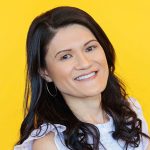 I was born and raised in Los Angeles, but headed to the East Coast for college. I completed my undergraduate studies in biochemistry and biophysics at Yale University. It was in college that I first became interested in medicine, after spending some time at a local clinic and several summers abroad in developing countries working on innovative health care delivery programs. During medical school, I was drawn to the field of ophthalmology because of the mix of medicine and surgery, the wide variety of interesting pathology and the gratification of preserving and restoring vision. I completed my ophthalmology residency at the Massachusetts Eye and Ear Infirmary/Harvard Medical School, and obtained additional fellowship training in ophthalmic genetics at the National Eye Institute, National Institutes of Health.
I was born and raised in Los Angeles, but headed to the East Coast for college. I completed my undergraduate studies in biochemistry and biophysics at Yale University. It was in college that I first became interested in medicine, after spending some time at a local clinic and several summers abroad in developing countries working on innovative health care delivery programs. During medical school, I was drawn to the field of ophthalmology because of the mix of medicine and surgery, the wide variety of interesting pathology and the gratification of preserving and restoring vision. I completed my ophthalmology residency at the Massachusetts Eye and Ear Infirmary/Harvard Medical School, and obtained additional fellowship training in ophthalmic genetics at the National Eye Institute, National Institutes of Health.
——————————————————
To listen to the EXTRA portion of this show go to RealEstateInvestingForWomenExtra.com
Learn how to create a consistent income stream by only working 5 hours a month the Blissful Investor Way.
Grab my FREE guide at http://www.BlissfulInvestor.com
Moneeka Sawyer is often described as one of the most blissful people you will ever meet. She has been investing in Real Estate for over 20 years, so has been through all the different cycles of the market. Still, she has turned $10,000 into over $5,000,000, working only 5-10 hours per MONTH with very little stress.
While building her multi-million dollar business, she has traveled to over 55 countries, dances every single day, supports causes that are important to her, and spends lots of time with her husband of over 20 years.
She is the international best-selling author of the multiple award-winning books “Choose Bliss: The Power and Practice of Joy and Contentment” and “Real Estate Investing for Women: Expert Conversations to Increase Wealth and Happiness the Blissful Way.”
Moneeka has been featured on stages including Carnegie Hall and Nasdaq, radio, podcasts such as Achieve Your Goals with Hal Elrod, and TV stations including ABC, CBS, FOX, and the CW, impacting over 150 million people.
Getting Started In Real Estate Investing With Stephanie Holleman – Real Estate Women
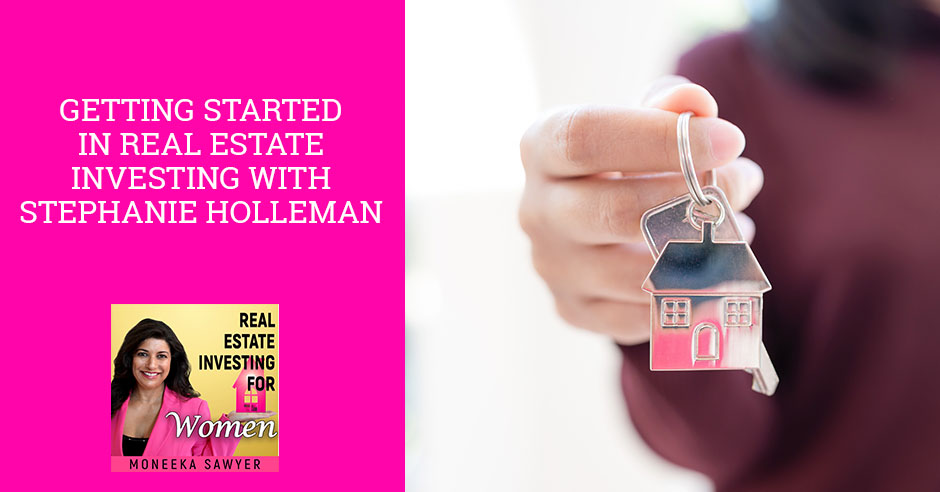
Want to start investing in real estate but don’t know where to begin? Then this show is for you. In this episode, Moneeka Sawyer talks to Stephanie Holleman, an IO psych business management, interior design sales, and real estate investing specialist. Stephanie imparts her experience and knowledge on how she shifted and started a career in real estate. She also provides helpful tips on improving your skills, choosing your business circle, and how to work efficiently. Discover these and more, get started on that journey, and begin to see results!
—
Watch the episode here
Listen to the podcast here
Getting Started In Real Estate Investing With Stephanie Holleman – Real Estate Women
Real Estate Investing For Women
I am excited to welcome you to the show, Stephanie Holleman. This is what Stephanie says about herself, “As a single mom with a creative mind and four cool kids, I’m constantly seeking ways to improve myself, my work skills, and pass on my zest for life. It’s difficult for me to sit still, and I find the most joy in spending time with my little people who aren’t so little anymore outdoors, playing in the water and using my noodle to solve problems. I have a background in IO Psych, Business Management, Interior Design Sales, and Real Estate Investing. I nerd out over personal development and business development books, and I love people. It has been a fun ride so far, and I love using the skills I have gained along the way to aid in changing lives.” I love that bio. Stephanie, welcome to the show.
Thank you.
Nice to meet you.
Nice to meet you too.
I know you worked for Zack Boothe, who we have had twice on this show. The first time I met him, he reached out to me from the blue. I didn’t know him. We chatted, and while I was impressed with his heart, capacity, and the business that he’s built, I was excited about the fact that he talked about wholesaling, which is something that my ladies have asked about a lot. I have to make a confession. I believe that wholesaling is buying another job. It’s not investing. It’s getting another job. It’s not something that I’m passionate about or even ever wanted to try but that doesn’t mean that my ladies don’t have a right to take a look at it.
It’s an amazing way to get started, and I have seen what Zack’s done with his business, where he doesn’t have to work. It’s taken some time to get there like any business. I have been impressed with what he’s done with his own life and business, how kind he is, and how committed he is to his students, so I brought him back on the show.
It was funny because I have been looking for another wholesaling mentor that’s a woman. I have had a couple of women stand me up on the show, literally three times no shows, not calling me back, being disrespectful in ways that I would rather they not be disrespectful to me. How we do anything is how we do everything.
If you are disrespectful to me, you are going to be disrespectful to my ladies. I loved how on target he is. He responds to everything I ask. He gives me everything I needed and was great on the show. I thought, “This is the guy I would like to introduce to my ladies.” I brought him back, and then he was like, “You need to meet some of my lady students there, and my right-hand person is a woman too. You need to meet her.”
I’m delighted to be speaking to you, who is his righthand lady. I love it. Other than his wife. He’s crazy about his wife and stuff but it’s sweet. Thank you so much for coming to the show and helping my audience to understand a little bit more about how Zack’s systems work and how it might benefit my ladies.
Thank you for having me. This is exciting.
Tell me a little bit about your background because this one is all about you.
I feel like I was in the right place at the right time when I landed this gig with Zack. As a single mom, I went back to school several years ago to get a degree in Industrial-Organizational Psychology, which is what IO Psych is. I then switched to Interior Design. Long story short, which I absolutely loved but my goal was to use my interior design skills to start flipping houses.
I knew that real estate investing was more lucrative and would get me to retirement more quickly but then, when I started learning about real estate investing, I learned it didn’t have much to do with interior design at all. The more I learned about it, the more I loved it and wanted to switch over to the industry full-time. I was looking into learning from Zack and found him on social media. I watched his $40,000 in 40-day Challenge.

Real Estate Investing: When you get to make choices, you choose people that are going to support your dreams and support your capacity to achieve those dreams.
I’m glad you mentioned that because it is inspiring. It’s BlissfulInvestor.com/40days. Ladies, write that down. Go check it out. It’s awesome.
It’s good. It’s inspiring, and it gives you a lot of good golden nuggets about wholesaling and getting into the industry. I was following Zack on social media, and he posted a video about recruiting someone to help manage and structure sales for him. I reached out to him, and the rest is history.
Instead of taking his course, you decided to work for him. That’s how much he impressed you. Is that true?
Yes. You see him on his videos and talk to him but he’s even better in person. That sounds cheesy but it’s so true.
Tell me a little bit about what it’s like working for him. What happened next?
Working with Zack enriches my life. They say that you become the five people with whom you surround yourself. Even before I knew him and what he was like, I wanted to surround myself with people like him. When I started working with him every day and his team, they were all rock stars. We know him and what he’s like if you have seen his videos. He’s hardworking but very supportive and positive.
He’s a big goofball. He’s so fun, positive, uplifting, inspiring, and successful. He knows how to get there. What we don’t see in his videos that I get to experience and his students every day is that he’s very good at teaching those things. He’s good at teaching core values, hard work, and all the things that he does. He teaches it well.
You said something key that I want to highlight for my ladies, which is you become like the five people that you spend the most time with. This is important. It’s important in our personal lives and in our business, too. If in your personal life, everybody around you says, “You can’t do real estate. That’s scary. That’s risky,” or whatever it is, as much as you may believe in it, you are going to start believing it. You can’t help it.
The people that are around us influence us. They influence how much we smile, cry, and believe in ourselves or the businesses that we are going into. We can’t always choose family. A lot of us spend a lot of time with family that doesn’t get it. What’s important is to then when you get to make choices, you choose people that are going to support your dreams and the capacity to achieve those dreams.
We talk a lot on this show about getting a mentor. Stephanie is talking about she has this mentor that supports her life, core values, the way she wants to do business, and feels positive. Those are all things that are good to have in our businesses or work. I feel fortunate. My husband is the ultimate example of bliss. He lives his life in constant joy. He will not compromise on that, to the chagrin of many people. I love that that’s his highest priority. For me, that’s something that supports my goals in life.
Every single mentor that I brought into my business has also supported that focus on bliss. They don’t tell me things like, “Moneeka, do you want it enough?” That is not going to work for me. It’s, “Moneeka, this will support your bliss, and this is how.” A mentor needs to understand what my highest values are. This is what I’m learning from you about Zack and what I love. It’s a beautiful example for my ladies of, “If your core values are such as such, make sure that you are finding a mentor that supports that.” Wouldn’t you agree?
Yes, 100%.
This next question that you sent that I love makes me cringe. You said, “Do you love talking to people on the phone, and why?” I hate talking to people on the phone. Talk to me a little bit about that. I don’t hate it. I love talking to my ladies, please don’t get me wrong but it’s not my favorite thing to do just being on the phone.
Not every conversation is hearts and rainbows. There are some people that are very difficult to talk to.
It can be scary. When I first was offered the position by Zack, I was asked by my closest family and friends, “Are you going to like this? Are you going to be happy talking to people on the phone all day?” Before this, I was an interior designer and called myself the Utah Pinball. I was all over Utah all day, every day, and I loved it. As I said, in my bio, “I can’t sit still.” When you talk on the phone, you have to sit in. I have to sit in my office and talk on the phone all day long. That was a question that I had as well. However, everyone is so different. I talked to people from all walks of life of all different experiences and levels, and it’s like being a phone pinball.
I talk to people all over the country and even outside of the country who want to get started on their investing careers, which is also very inspiring. I’m becoming the people with whom I surround myself, and it’s not only five people. Honestly, I talk to people all day long who inspire me, who are entrepreneurs, who want that time and financial freedom. I get to tell them how to do that.
How Zack can do that for them? It’s extremely rewarding, and it’s a lot of fun getting to know people, talking to them, and hearing about their lives and goals. It’s breathtaking every single day. Not every conversation is hearts and rainbows. There are some people that are very difficult to talk to but for the most part, it’s very inspiring and fun.
There are a couple of things I want to highlight. First of all, ladies, this is one of the key points that I have the biggest challenge with is calling people. I wanted to talk to Stephanie a little bit more about that, how she gets herself psyched up, what she does to prep for her calls, and those things. We are going to be talking about that in EXTRA. We are going to do a deep dive on cold calling in EXTRA. She will give you a lot of details around that.
The other thing that I wanted to highlight is that she mentioned that it’s not by people, it’s that she surrounding herself with people that inspire her. We have talked a lot on this show about networking or going to groups. We have had Deborah Razo on here, who’s built a community, Women’s Real Estate Network. She’s built a community of women that are inspiring and there to support one another.
We have had several conversations about where can you go to surround yourself with people that uplift and inspire you around real estate. Who is it that you can have engaging, uplifting conversations that say you are on fire about real estate? Start looking for those on Meetup, REIAs, and WREN. You can check out BlissfulInvestor.com/wren. Take a look at where you can spend time. It’s not the five people that you are dependent on. You have an entire community of people that help to uplift you and help you succeed.
Thank you for mentioning that because it’s so important on these levels of what our relationships. We’ve got our top five that we spend the most time with, then we’ve got our community, the places where we spend most of our time with, and the people that we have most of our conversations with. There are a lot of different people. When you get a phone call from one of my ladies, what is your goal in talking to them?
My goal is to give them all the information they need to make an educated decision as to whether or not Zack is the right fit for them as a coach. Attempting real estate investing on my own in the past, I learned very quickly that we can’t do anything alone. We need that community that we were talking about. Zack is a good coach. He’s there for people. He has a tried-and-true system and he gives to you everything. My main goal is to give all of his potential students or candidates, all the information they need so that they can decide if that’s right for them or if they need to move on to a different type of coach.
Different coach or strategy. No strategy is right for everybody. I’m a buy-and-hold person. Wholesaling may not be right for me but buy and hold may not be right for you to anybody who’s reading. Maybe wholesaling is a place to either get started or invest all of your energy into. I always say there are a million ways to make a million dollars in real estate. Not all of those million ways are going to be good for you. If Zack is the right guy or wholesaling is the right strategy, those are some things that you want to look at.
You also want to look at the core values. Make sure your core values and personalities match up. The lead generation and exit strategies, and the goals that you have for your business in your business model, that’s huge when choosing a coach.
How much detail about their experience do you need to know? What is it that they are going to be bringing to the table for you?
All of it. I need all the experience. I want you to hear all about their backgrounds, stories, and goals. As I said, I talked to everyone from all walks of life in all experience levels. I would be talking to a young lady who’s 18 or 19 and on fire about life and wants to be successful right out of the gate but only knows that the concept’s barely in real estate investing. I want to hear all about that and why and what they know about the concepts.
Sometimes I will talk to someone who has been wholesaling for 30 years, and they are very successful and want to add another lead generation strategy. They see Zack and what he does, what he can do, and want to duplicate that. I talk and ask them. We dive deep into their experience. I talked to everyone in between those as well. I want to hear about all of it. That’s part of what I love.

Real Estate Investing: Pick one lead generation strategy, one exit strategy, and be consistent.
Do people need to have a lot of experience in real estate or any experience to do this? Tell me a little bit more about that. Honestly, what do they need to come to you with?
They don’t have to have any experience whatsoever. They don’t even need to know about the concepts. People book a call with me because they understand that real estate investing can give them time and financial freedom, and anything beyond that, Zack will teach them. They don’t have to have any experience whatsoever.
What ignited my curiosity is that he was talking about wholesaling and was like, “I might buy ten properties and then keep two as long-term rentals,” which I’m like, “I could get my long-term rentals for cheap,” because that’s my strategy for this long-term renting. You can also marry this strategy with other strategies that you might be interested in. You’ve got to start somewhere. A lot of people are like, “I don’t even know where to start. I’m embarrassed to make that phone call because I don’t know anything.”
Zack teaches you how to cherry-pick the best and wholesale the rest. You will hear him say that.
You are comfortable talking with real beginners who don’t know anything.
Yes, all levels.
I love the example of the person that has been wholesaling for 30 years, too. It is nice that you have spoken to that huge range. You have an understanding of what those conversations feel like and what they need. How long does it take a student to get started, and what are their first steps?
It only takes a couple of minutes. I create an account for them right then and there. As soon as that account is submitted, they immediately get the course in their inbox and instructions on how to connect with Zack. When you get onboarded, you get Zack’s personal cell phone number, which is crazy. He hasn’t missed a call from his students the entire time that he’s been coaching. He’s always there for people.
You get all of that within minutes. The next step is to go to your email inbox and click to get into the course and onto the Facebook group that’s for his students only. What I do is I ask the new students a photos of themselves so that I can send their photos and introduce them to our team. If anyone needs anything, we are all here for them. We can put a face with a name, and we all know who we are talking about.
I will send their phone number to Zack, and he will give them a call within 24 hours to introduce himself and get to know them, their goals, their business model, and everything. In that way, they have his cell phone number. They can save it on their phone and call or text him whenever they have an urgent question, deal on a line or anything. It’s very simple and quick. Quite frankly, a lot of fun.
Once they do all that stuff, what do you feel is typically the time that a person might need in their schedule to follow the course work and take the steps, and how quickly can people start to see results?
Zack’s course is designed for people who might be facing from their full 9:00 to 5:00 job into their own wholesaling business. You can spend as little as fifteen hours per week on it. That’s everything from education to taking action to closing those deals. If they are doing it full-time, they can spend more time, and Zack will tell them exactly where and how to spend that time to make it most efficient.
Is it the stuff you can do on a weekend or do you have to do it during business hours?
When you start investing in real estate, don’t try to do it alone because you’re going to make many expensive mistakes and spend a lot of time trying to figure out how to make it work.
No, you can do it any time of day or night, evenings, weekends, or whatever time works best for people.
How can people get in touch with you to learn more?
They can book a call with me. They go to BlissfulInvestor.com/stephanie. We are hiring a new onboarding specialist because we are busy. I can’t handle all of it myself. We are bringing someone on board. We offered them the position, which is exciting. They will be talking to me or the other person. We will then dive into everything so that you can make a good determination whether or not we are a good fit.
That is BlissfulInvestor.com/stephanie. Go check that out and give Stephanie a call or sign up with her. That would be amazing. For EXTRA, we are going to be talking about how to make these phone calls fun so that we love them as much as Stephanie does. Stay tuned for that because that’s going to be an amazing, awesome conversation that I personally need. I’m excited about it. Stephanie, are you ready for three rapid-fire questions?
Yes, I am.
Tell us one super tip on getting started investing in real estate.
Get a coach or mentor, whether it’s Zack or someone else, don’t try to do it alone because you are going to make a lot of expensive mistakes and a lot of time trying to figure out how to make it work.
What is one strategy for being successful as a real estate investor?
Pick one lead generation strategy and one exit strategy, and be consistent.
What is one daily practice that you do that you would say contributes to your personal success?
A lot of positive self-talk. This world is filled with a lot of negativities. We have bad days and even some bad times during our good days. Sometimes it takes a lot of positive self-talk to work ourselves and power through those crazy times and be positive.
I absolutely agree on that one. Ladies, thank you so much for joining Stephanie and me for this portion of the show, we do have more in EXTRA. We are going to be talking about getting on the phones and making that fun. If you are subscribed to EXTRA, stay tuned, if you are not, go to BlissfulInvestor.com is my website.
If you want to sign up for EXTRA, go to RealEstateInvestingForWomenEXTRA.com. You get the first seven days for free. Check it out. Thank you so much for joining Stephanie and I for this portion of the show. If you are leaving us now, I look forward to seeing you next time, and until then, remember, goals without action are just dreams. Get up there, take action, and create the life your heart deeply desires.
Important Links
- Stephanie Holleman – LinkedIn
- BlissfulInvestor.com/40days
- Deborah Razo – Previous episode
- BlissfulInvestor.com/wren
- BlissfulInvestor.com/stephanie
- RealEstateInvestingForWomenEXTRA.com
About Stephanie Holleman
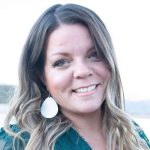 As a single mom with a creative mind and four really cool kids, I’m constantly seeking ways to improve myself and my work skills, and pass on my zest for life. It’s difficult for me to sit still and find the most joy in spending time with my little people (who aren’t so little anymore) outdoors, playing in the water, and using my noodle to solve problems. I have a background in I.O. Psych/Business Management, Interior Design, Sales and Real Estate Investing. I nerd out over personal development and business development books, and I LOVE people!! It’s been a really fun ride so far, and I love using the skills I’ve gained along the way to aid in changing lives!
As a single mom with a creative mind and four really cool kids, I’m constantly seeking ways to improve myself and my work skills, and pass on my zest for life. It’s difficult for me to sit still and find the most joy in spending time with my little people (who aren’t so little anymore) outdoors, playing in the water, and using my noodle to solve problems. I have a background in I.O. Psych/Business Management, Interior Design, Sales and Real Estate Investing. I nerd out over personal development and business development books, and I LOVE people!! It’s been a really fun ride so far, and I love using the skills I’ve gained along the way to aid in changing lives!
______________________________________
To listen to the EXTRA portion of this show go to RealEstateInvestingForWomenExtra.com
To see this program in video:
Search on Roku for Real Estate Investing 4 Women or go to this link: https://blissfulinvestor.com/biroku
On YouTube go to Real Estate Investing for Women
Moneeka Sawyer is often described as one of the most blissful people you will ever meet. She has been investing in Real Estate for over 20 years, so has been through all the different cycles of the market. Still, she has turned $10,000 into over $5,000,000, working only 5-10 hours per MONTH with very little stress.
While building her multi-million dollar business, she has traveled to over 55 countries, dances every single day, supports causes that are important to her, and spends lots of time with her husband of over 20 years.
She is the international best-selling author of the multiple award-winning books “Choose Bliss: The Power and Practice of Joy and Contentment” and “Real Estate Investing for Women: Expert Conversations to Increase Wealth and Happiness the Blissful Way.”
Moneeka has been featured on stages including Carnegie Hall and Nasdaq, radio, podcasts such as Achieve Your Goals with Hal Elrod, and TV stations including ABC, CBS, FOX, and the CW, impacting over 150 million people.
Get Unlimited Private Money With Amy Mahjoory – Real Estate Women
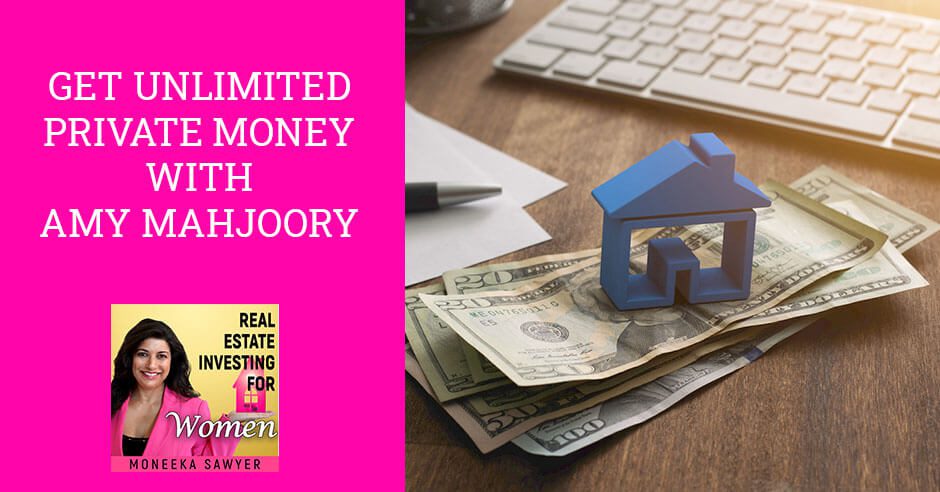
Raising capital is an important part of starting a business. And private money is one way to get your real estate investments financed. In this episode, we examine how as Moneeka Sawyer deep dives into raising money with real estate investor and educator, Amy Mahjoory. Amy has helped thousands of real estate investors with private money, walking us through each step. From building relationships to crafting your pitch, Amy lets us have a look at her process. Tune in and learn more about building a real estate business right here.
—
Watch the episode here
Listen to the podcast here
Get Unlimited Private Money With Amy Mahjoory – Real Estate Women
The Golden Rule For Raising Capital
I am excited to welcome to the show, Amy Mahjoory. She is a real estate investor and educator, HGTV personality, bestselling author, and keynote speaker. Her life didn’t start in real estate. After fourteen years in Corporate America, she had her fill working for other people. Although she was a highly recognized global leader in procurement, logistics, and operations management for Dell Computers, she decided that a traditional education combined with the false security of a 9:00 to 5:00 was not producing the results she wanted.
Real estate was the game-changer. She has been investing in real estate over the last several years. During that time, she has raised well over $20 million in private money. As a result of her immediate success, she went on to resign from her corporate job to pursue her passion for real estate. Shortly thereafter, she signed a contract with HGTV and began coaching real estate investors all over the country on the same creative rapport and trust-building strategies, systems and scripts that she still uses in her business now. Here is the best part, all of this can be done without having to depend on friends and family members for private money. This is her new passion and focus.
She helps her students transform their minds so that they can feel confident raising private money. She takes the fear out of raising capital and breaks her systems down into a methodical and easy-to-follow system. Her greatest achievements go beyond what she has accomplished herself. Many people become successful in real estate, but her talent is helping others become successful themselves. She has a genuine interest in helping others succeed. Most of her success originates from her streamlined operations and proven systems. She changes people’s lives. Amy, welcome to the show.
How are you? It’s great to be here with that warm welcome.
This is what I love about you. Your bio is so much more about what you’ve done for others. It’s not all about, “I’ve accomplished that,” because you’ve accomplished quite a lot. It’s pretty amazing. Thank you for that. Can you talk a little bit about your story? How did you transition from corporate to entrepreneurship?
Surround yourself with people on a similar path. Believe in yourself, and you will do great things.
My background is very traditional. Like many people out there, I was raised to go to school and get good grades, get a job at a secured stable company, and collect my paycheck for the next 25 years until I retired. The transition for me was easy because once I realized real estate was my new path, I had goals and was committed. I invested in coaching and mentorship. Where it became challenging was the lack of support from my friends and family members, specifically my dad. That’s a whole other conversation.
For me, I’m a product of the system. A lot of people out there can relate to similar situations and losing friendships along the way. It’s always like, “Perseverance will prevail. Keep your head down. Surround yourself with people who are on a similar path. Believe in yourself and you will do great things.” For me, it was an easy transition because I knew I was going to do it. I was committed to doing it.
Some people are committed but they second guess. I love the power of, “I’m committed, even if my dad doesn’t like it.” Many of us are influenced by our families. “People may not like it. It doesn’t matter. I’m doing it.”
Once you know your role and you’re confident in who you are and what you’re doing, it makes that decision-making process so much easier. At the end of the day, I still have to do what’s right for me and my family while respecting my dad, for example. That’s why I believe so much in coaching. The reason I had so much immediate success was because of my coach. If I didn’t know what I was doing, I worked at the corporate for fourteen years, but they helped me with that fast track to success which was cool.
Talk to me a little bit more about overcoming the roadblocks that maybe family and friends put in front of you. A lot of us women are susceptible to that and experience that.
The hard part for me was I’m very sensitive. I wear my heart on my sleeve and I don’t like disappointing my parents, even as an adult. I always seek out my parents’ approval. I want them to be proud of me. They are now. My dad is my biggest cheerleader now. It was very hard for me, more so losing my two best girlfriends during that transition because I was so excited and passionate. I know real estate can be a game-changer for everyone. That’s why I coach and preach it. They didn’t want to hear it. Until this day, I still believe that I drove them away from me.
It was very hard. I cried for years. Even when I speak on stage, I share this example and I get emotional. However, I’ve also learned that friendships are seasonal. People come in and out of our lives for a reason and their purpose was served. I made a bunch of amazing friendships along the way. I never expected my entire inner and outer circle now to be other real estate investors, entrepreneurs and business owners. Our girls’ trips are masterminds. Don’t get me wrong, I still have my OGs. We have fun and go out. It’s just different.
For me, it’s the same way. When I do ladies’ weekend away, we’re ten real estate investors and professionals in that industry. Not a single one of us is an agent. Just because you’re in real estate does not mean that you need to be an agent. I want to emphasize that again. There are a lot of people in the industry that do a lot of this stuff around what we do. It’s so interesting because I remember when I got started with this show, I’m so passionate about real estate anyways, but it’s always been my side hustle. This is what brought me into this fear of learning more about real estate, expanding my own influence, and also my own learning. That’s why I keep going because I learned so much.

Private Money: Once you know your role and are confident in who you are and what you’re doing, the decision-making process becomes much easier.
Suddenly, I’m having these real estate conversations with all my friends. That’s not what we used to talk about before. People are getting a little bit uncomfortable. I had several friends that were like, “I’m totally inspired by you. I’m going to go get my real estate agent license.” I’m like, “No, that’s not what we’re talking about. We’re not talking about getting another job and not investing and not growing your own wealth, and doing that for other people. We’re talking about this.”
Over and over again, “Don’t get your license. Don’t spend all your time on a license. Go get a mentor, learn to be an investor.” I lost so many friends because they got tired of hearing, “Don’t spend all your time and money becoming an agent,” because I was pretty bullheaded about it. I can see what happens when you spend all that time and money doing that. It does not grow your wealth and freedom. In a lot of cases, it takes away your freedom. Some people want to do that. That’s great, but that’s not the strategy for becoming an investor necessarily. I had the same experience, lots of nights crying because people dumped me.
It’s part of the process and journey. We’re going to have the highs, lows, wins, losses, make money and lose it all. I had this conversation with a girl who was at my LA event. She was like, “I’m going to go get my license,” and I was like, “Why?” She said, “Don’t I need to?” I’m like, “No. Don’t get your license.”
For those of you who may not already know this, there are so many ways where we can still generate referral fees and additional income without being a realtor by referring people to realtors. I always believe in working smarter, not harder. I’m not going to spend time getting a license when I don’t need it to list my own properties. I don’t want to list someone else’s properties because that’s another job to your point.
The other thing is once you have a license, you have to hang it. You’re legally obligated to hang it. You have an obligation now to a broker. That broker is going to have expectations. Every year, you have to do your education to renew and to get your hours. You have to renew your license every four years. It’s been a long time since I had my license, so these numbers may be different and they’re different in different states, but there’s a lot involved in that.
In California and a lot of states, you have to disclose that you’re a realtor, which means you often lose offers because people don’t trust a realtor-buyer sometimes. I found that to be the case for me too. It was a complete hindrance in my business and took all this time and energy. I want to work 4 to 10 hours a month. That was a lot more time and energy that was getting put into my business that wasn’t necessary. Talk to us about your transition to HGTV. How did that happen? What did that do for you?
I did have a goal when I first started to be on TV. I didn’t share it with many people. I wanted my own show. I was in the middle of hiring a virtual assistant. She was 21 years old. I was surprised when she asked me, “What are your short and long-term goals?” I was like, “Who is this girl?” I loved it and appreciated it. I ended up hiring her and I said, “One of my goals is to get on TV,” and by having a voice. I always talk about word of mouth going a very long way. She responds with, “My mom knows a producer at HGTV, would you like an introduction?”
I said, “What show?” She said, “House Hunters,” which many of us know that show. I respectfully declined her offer because I thought to myself, “I don’t want to be on House Hunters. I want my own show.” Two days later, I thought to myself, “Amy, what are you doing? You wrote a book on networking. Get your foot into the door with this lady and see what happens.” That’s what I did. I had a snowball effect. I hit it off. I was on House Hunters. We did a four-part mini-series, but it’s cool because they broke the mold with me.
Everyone you encounter is a prospective private money lender.
In the 12 or 15 years at that time that they had been filming, they had never had an investor on the show. They showed my transition out of Corporate America into real estate on the show. My contractor walked through projects before, during and after. That was cool and it was great for credibility. The relationships, I still have and cherish until this day. I realized I don’t want my own show because it is a lot of work and that’s not a priority for me anymore.
For a long time, I thought I wanted my own show and then I realized there’s this thing. Ladies, this is relevant to you too. How many times are you shooting for something because you think it would be cool? You’re afraid of missing out. You want to have that credibility and whatever it is in your life that you’re looking for that lifts you, but so much that we drive towards is not serving our core values or serving our dreams. This is something that I’m focusing on now on the backside of the pandemic where I’ve been sitting at home for two years. I’ve had so much time to think about, “What is it that makes my heart sing?”
Traveling and speaking, I was gone every single weekend. I remember the year before the pandemic, I was home for six weekends out of the entire year because I was traveling. I miss my husband, my little dog, my family and my life, but I was doing it because it was what was expected, it gave me more credibility, got my voice and message out there, and all of those things, but it wasn’t doing it in a way that supported the bliss of my own life.
As we move forward, I’ve realized, “No, I don’t want a television show. I don’t want to be working that hard. I want to be working hard on the things that are going to reach my goals and are aligned with my own core values and the things that make me happy.” I love that you mentioned that because we can have so many opportunities. Which ones do we choose?
I hear you talking and I hear myself. We were the exact same. That’s the only reason I wrote the book. I wrote this bestselling book because all my friends were writing a book and I’m like, “That’s the next thing to do. I got to beat my friends. I got to be bigger and better.” Now, I love what I do and it’s the only thing I want to do. I’ve cut back on speaking and all these other things. I don’t care anymore. I want to do genuinely what makes me happy, but I also treat it as a business and capitalize on it. How do we do that?
Talk about what you do.
I never thought I would be a nationwide coach showing other investors all over the country how to raise private money. That’s what I do now. I was a leader at Dell, but I was never a manager of people. I was always an individual contributor. When I got into real estate, I never thought I would be hiring a team of twenty people and getting on stage and being on TV. I was super shy growing up. For the first eight years of my real estate career, investors kept saying, “How did you raise all this capital? You must have asked your friends and family.” I was like, “No, it’s the opposite because I’m so stubborn.”
Once they heard that out, they were like, “What list did you buy?” I have never bought a list to target private money lenders. If you have, great. I would love to hear how your experience was. I launched a coaching program a few years ago, once my daughter turned one because I wanted to be a soccer mom. Now, I get to still stay connected with investors all over the country from the comfort of my own home while changing their lives and showing them how to raise capital to get 100% funding for their deals. That’s my main focus now. I’m still an active investor so is my husband, commercial, residential and all that stuff, but now I’m a coach myself and it’s on one topic.

Private Money: We just want to do what genuinely makes us happy, but also treat it as a business and capitalize off it.
The topic that you focus on specifically is private money. I want you to dive a little bit deeper because the very first time that you and I connected, everything you said was like magic. I was like, “That’s so cool.” That’s why I wanted to bring you on. Tell us a little bit more about the private money angle. I know that the way that you approach it is different. You’re not going after friends and family. At least, in the beginning, you opted out of that.
I still don’t because I’m stubborn. If you guys get out there and you listen to podcasts and read books, you take other coaching programs, the majority, if not every real estate educator out there will say, “Raising capital is easy. Go ask your friends and family members.” What if you don’t want to? What if they’re not supportive? What if they’re not in a position to invest? How do we get out there and build rapport and trust with strangers?
I’m talking about your Uber driver, cashiers at a grocery store, people at airports, church communities, sporting events, happy hour, anyone and everyone you encounter is a perspective private money lender. How do we make those mindset shifts? Start planting seeds to open up those conversations to coffee talks where you get them to ultimately invest with you. What I teach is raising capital from people who aren’t even a part of your inner circle. I have students who want to target their friends and family members, and I show them how to have those conversations as well.
I have taken her online course. It’s phenomenal. Ladies, you know that I will not recommend a course unless I’ve vetted and liked it. Many of you asked me, “Moneeka, if you’re only working 4 to 10 hours a month on your real estate business, what’s all this other time? Why are you always so busy?” First of all, this show takes a huge amount of my time because I want it to be the very best for you, but the other thing is I will not recommend anything to you that I have not been through myself.
I take a lot of coursework, not that I need it. I’m not doing this for me. I’ve got my business, but I do love to learn and I do want to get to know the people that I am doing business and partnering with, so I vet their courses. Over the last few years, I’ve vetted twenty courses and only two that I have recommended. It’s a lot of work that goes into that. I’ve never shared this before, but this is what I do. If I’m going to recommend it to you, I’ve been through it or one of you have been through it.
I meet with some of you and you tell me, “I have this great coach. I’ve got a great program.” That’s how I met Mark Willis. Someone else recommended him to me because they loved working with him. You’ve heard from him a few times. A lot of it is recommendations and coursework. Many times, I’ve done the investing with them before I’ll recommend them. I don’t vet everybody that’s on the show and that we do courses for, but I will tell you if I’ve gone through their coursework and I have with Amy. That allows you to feel a little bit more comfortable about the recommendation. I do want to be clear, I don’t vet everybody on the show.
Some of the people out there who know me or many of you who may not know me, I’m raw, real and direct. I’m very approachable and easy to talk to. I am not scripted. It’s a proven system. It’s stuff that I’ve been doing for many years. I’m tested and fine-tuned. If you are coachable and can follow steps, I’ll hand you everything you need on a silver platter, “Do this, call this person, say that. Call me back when they do this.” You will have success and can raise unlimited capital if that’s aligned with your goals. All of our goals are different.
Having money is a good problem to have.
It’s cool because, with private money, there are endless opportunities. You don’t have to flip or wholesale. Buy five rental properties tomorrow with private money. Start a fund and invest in commercial syndication. Invest in a multifamily deal. There is so much we can do. I’ve got mortgage brokers and realtors who learn how to raise capital because all they want to do is generate referral fees for their investor clients. Having money is a good problem to have. Let’s educate people on why they should invest with us.
Do you find that when you raise the money, you should have some idea of where it’s going to go before you raise the money? They’re excited about giving you money and then you stalled.
The answer is no, we do not need to have a deal right now. We don’t want to wait until we have a deal. For those of you who are looking for a deal, whatever your strategy is, we want to be looking for deals and raising money at the same time. Even though I’m telling you that you’re going to raise money from your Uber driver, which is what I did and what you can do as well, it is rapport-based lending. We’re building a relationship and developing trust. You can do this in as little as three weeks, but you don’t want to wait until you have a property under contract. You want to be proactive in that skillset.
You’ve told us a little bit about what makes your course different. You’re talking about not going to friends and family, and doing the fundraise simultaneously. There are some other special things about your course.
I know a lot of big and small name educators out there and nobody teaches private money the way I do. No one teaches how to get creative and think outside the box. I have over 54 different creative trust and rapport-building strategies scripts and templates. My course is a done for you system. I give you all twelve of my credibility pieces, all my contracts, and my list of FAQs. What’s cool about the program is the online portion is eight different modules. Each module is built upon the previous one. In order to have success, you want to come and watch the videos, and do the action items in order of priority because it all means to one another.
I don’t guarantee success and I never will. I have a 90-day money-back guarantee because I can and it works if you follow the system. What’s also unique about my program is I give you lifelong access. Not just to your online curriculum which I’m also fine-tuning and tweaking because I’m still an active investor, but you get lifelong coaching with me that does not expire. I’m not going to call you six months later and be like, “Your coaching is expired. Would you like to reinvest?” That’s it. One investment, lifetime access. It’s a no-brainer.
It’s unheard of. While we’re talking about the course and since you ladies already know a little bit about it, Amy and I are doing a few things together for you. We want to do a webinar. We’re calling the webinar Grow and Scale Your Real Estate Empire with Private Money. We’re going to be doing that together so you can meet Amy, ask questions live, and all of that stuff. If you want to join us, go to BlissfulInvestor.com/PMWebinar. The webinar is going to be held on Thursday, April 7th, 2022 from 1:00 to 2:30 Pacific time. Let’s talk about that a little bit more. What are we going to be covering, then I’ll talk more about the coursework.
My webinars are pretty insightful and eye-opening. People are walking away mind blown, which is cool. We have plenty of time in the end for Q and A so I got you. I always keep it simple and to the point. I always focus on three things. Number one, what is private money? Who are we targeting? Who aren’t we targeting? Where is it? Number three, how do we obtain it? How do we get our hands on it?

Private Money: Follow proven systems, be coachable, and you will have success.
When you understand all three of those points, you can obtain 100% funding for your deals moving forward. This is regardless of your experience, credit, and whether or not you’re doing this part-time or full-time. None of that matters. Follow these proven systems, be coachable, and you will have success. We’ll get into some of those strategies during the webinars, so make sure you guys attend.
Grow and Scale Your Real Estate Empire with Private Money, Thursday, April 7th, 2022, 1:00 to 2:30. Go to BlissfulInvestor.com/PMWebinar. Some of you may be like, “I’m all-in. I want to do the course,” join us for the webinar also. If you want to do that, Amy’s already shared a little bit about the coursework. Do you want to give us a few more details before I give them some links?
One of the first things I have my students do is start building our foundation and getting ready to raise capital as early as module one. One of the key takeaways from module one is what I refer to as our Four-Second Power Pitch. In four seconds, you are going to explain to anyone and everyone, the minute you leave your house, who you are and what you do by dangling that carrot and getting them to ask you more questions about it.
The Four-Second Power Pitch is how I got Larry, a retired physician who was my Uber driver to become my money lender. That’s going to be step one. As we build our foundation, and there are a lot of things that go with building a foundation, how do we start to take action? It’s with your Four-Second Power Pitch. The minute you leave your house, anyone you encounter is a prospective private money lender. What do you say? It’s your Four-Second Power Pitch.
For our ladies that are subscribed to EXTRA, she’s going to give us a Four-Second Power Pitch in EXTRA. In that first module, she’ll be covering that. That’s the foundational building block. That’s where we start. From there, there’s a world of information in the course.
That’s opening up the door to having ongoing conversations with each of your private money lenders. Step two is, how do we take action? How do we find the people to book these coffee talks with? At these coffee talks, what do we even say to them? That’s going to get into all your credibility pieces and all the content that I give you. Don’t worry about what that looks like.
If you are in and ready to go, you can get her course. Go to BlissfulInvestor.com/PrivateMoney. That’s for the full-pay option. Her courses are insanely inexpensive. I can’t believe that she offers all this information for this little amount. It’s a good deal. If you can’t make the full payments right away, you want to do a payment plan, she offers that. She wants to make sure that everybody can get the advantages of this coursework. If you want to do a payment plan, go to BlissfulInvestor.com/PrivateMoneyEasy. Is there anything else you wanted to add?
I don’t think so. It’s a lot of fun. It’s a tight-knit community. It’s like a family. We got each other’s backs. A lot of us develop friendships and end up hanging out outside of our work and coaching environment, but you think about what if you could raise six figures in as little as 21 days. If you can raise six figures, how much more can you raise? What would your business and life look like?
You never know who you’re talking to. You never know who is standing in front of you. Be respectful, and follow the golden rule.
You can sit out there and go read a bunch of books and listen to a hundred podcasts, but why not leverage from my years of experience, lessons learned and mistakes? Stop posting desperately on Facebook groups. I see this all the time. Get the system in place and position yourself as a polished professional poised for aggressive growth. Get out there and do everything you’ve ever dreamed of when it comes to growing your real estate business. You can do it.
That’s the thing. Us real estate investors, what is it that we love? Leverage. Leverage when we’re purchasing and other people’s information. I love that you said it that way. Leverage her years of experience to fast-track yourself. Thank you so much for all that you offered in this part of the show.
It was great being here. Thank you so much for the opportunity to chat with you and your audience. I look forward to coming back.
We got more on EXTRA but before we move on to that, let’s talk about our three Rapid-fire questions. The first one is, what is the super tip on getting started investing in real estate?
Number one is to commit to it and decide that, whether or not it’s for you. Commit and then set your goals up.
What is number two? What is the strategy for being successful in real estate investing?
Once we have our goal, because thoughts expand, number two is to get after it. Get out there and take action. For example, take my Four-Second Power Pitch and start implementing it every single day. Practice it at home. Don’t just sit there and talk about it and do it. That’s why I could do a lot of these implementation workshops. We can sit here and talk about it and take a bunch of notes that you’re going to throw in the garbage, or we can meet up live and start taking action and see results. Just do it.
What is one daily practice that you use that you would say contributes to your personal success?
For me, it was treating anyone and everyone I encounter the minute I leave my house as an equal and specifically private money lender. I have struggled in the past with anger management. I had an anger management journal. I had a very low tolerance for poor customer service regardless of the industry. I’m comfortable saying no. I would go off on people. I would be rude to them if they were rude back.

Private Money: Anyone and everyone you encounter, treat them as equals or better yet, target them as private money lenders.
Once I decided to commit to being a real estate investor and a business owner, I said to myself, “You can’t talk to people this way. You never know who you’re talking to. You never know who is standing in front of you.” Be respectful, the golden rule from here on out. Anyone and everyone you encounter, treat them as equal and better yet, target them as private money lenders. How do you do that? My Four-Second Power Pitch. Everything is very closely linked to one another.
One of the things is that how we do anything is how we do everything. If you have to improve yourself or your business, you’re improving yourself for your life. That’s what blissful investing is all about. It’s who are you getting to become as you’re building your wealth because that’s the person that you are going to be when you’re wealthy. As you improve yourself, you’re treating people with a little bit more respect or a lot more respect whatever. That’s going to show up in every area of your life.
It’s going to show up in how you bring up your children. Our businesses help us to grow. They help us to become a better version of ourselves. I love that example. Nobody has ever admitted something like that on this show but it’s so amazing. Being vulnerable and allowing people to see that we all grow is a perfect example of that.
Thank you. I had a therapy session. I got personal and professional coaches. I’m like all of you. I’m still an investor and a student. All I’m doing with you is sharing the secrets behind some of my success. I’ve had plenty of failures too. What you choose to do with it is on you. I invite you to consider taking action, invest in coaching whether it’s with me or someone else, and start seeing results sooner than later.
Join us for our webinar. You can get to know Amy more. I always love meeting with you, Ladies. I’m trying to do this once a month. It’s like a community. Let’s get together. Several of you come to every single webinar, so I’m getting to know you. I’m loving that. Again, it’s on Thursday, April 7th, 2022 from 1:00 to 2:30 Pacific time, go to BlissfulInvestor.com/PMWebinar. Come join us for that. We’ve got more.
Stay tuned for EXTRA. We’re going to be talking about the Four-Second Power Pitch. You get that for free if you are subscribed to EXTRA. If you’re not subscribed to EXTRA, but would like to be, this might be the time. Go to RealEstateInvestingForWomenEXTRA.com. You get the first seven days for free. For those of you that are leaving Amy and me now, thank you so much for joining us. I always love spending time with you and I look forward to next time. Until then, remember, goals without action are just dreams. Get out there, take action, and create the life your heart deeply desires. I’ll see you soon.
Important Links
- Amy Mahjoory
- BlissfulInvestor.com/PMWebinar
- BlissfulInvestor.com/PrivateMoney
- BlissfulInvestor.com/PrivateMoneyEasy
- RealEstateInvestingForWomenEXTRA.com
About Amy Mahjoory
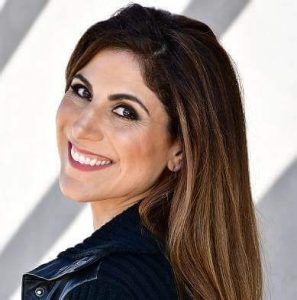 I’m a Real Estate Investor & Educator, Best Selling Author, HGTV Personality & Keynote Speaker who built my business by Networking w/ A Purpose!
I’m a Real Estate Investor & Educator, Best Selling Author, HGTV Personality & Keynote Speaker who built my business by Networking w/ A Purpose!
I am lucky to be able to travel the country, doing what I want – when I want, with who I want.
After building multiple businesses and through many lessons learned, I am able to enjoy my time coaching and mentoring real estate investors all over the country on how they too can grow and scale their real estate business by CONFIDENTLY raising private money!
The most important concept I teach is that with the right attitude, anything is possible.
I was born and raised in the midwest in one of the tightest families you’ll ever meet!
My mom and her two sisters married my dad and his two brothers before immigrating to America and no, none of it was arranged. They decided to buy homes within three miles of one another which is where they raised all of us! Although I technically have one brother, I always say that I am one of seven since I have five double cousins, we all look the same and we grew up within three miles of one another.
After attending undergrad at Michigan State University, I moved away from home for the first time to Austin, Texas where I landed a job working for Dell Inc. After working in Corporate America for over fourteen years, I was doing well, but felt like my true potential was elsewhere. I was completely burnt out and had no passion for the work I was doing. I knew I needed a change.
During my spare time, I was glued to all of those home renovation shows. I absolutely loved the idea of taking an old dumpy house and turning it into something new and modern!
Although it may have sounded a bit ambitious and even unrealistic, especially since I had no previous knowledge of the real estate market, my mind was set! I was on a brand new mission prepared to learn how I too could learn how to buy, renovate and then sell distressed properties.
In my hunt for quality real estate investing education, I found mentors Than Merrill, Paul Esajian and JD Esajian from A&E’s hit TV show, Flip This House. With their ongoing support, guidance and trust, my very first company was born.
______________________________________
To listen to the EXTRA portion of this show go to RealEstateInvestingForWomenExtra.com
To see this program in video:
Search on Roku for Real Estate Investing 4 Women or go to this link: https://blissfulinvestor.com/biroku
On YouTube go to Real Estate Investing for Women
Moneeka Sawyer is often described as one of the most blissful people you will ever meet. She has been investing in Real Estate for over 20 years, so has been through all the different cycles of the market. Still, she has turned $10,000 into over $5,000,000, working only 5-10 hours per MONTH with very little stress.
While building her multi-million dollar business, she has traveled to over 55 countries, dances every single day, supports causes that are important to her, and spends lots of time with her husband of over 20 years.
She is the international best-selling author of the multiple award-winning books “Choose Bliss: The Power and Practice of Joy and Contentment” and “Real Estate Investing for Women: Expert Conversations to Increase Wealth and Happiness the Blissful Way.”
Moneeka has been featured on stages including Carnegie Hall and Nasdaq, radio, podcasts such as Achieve Your Goals with Hal Elrod, and TV stations including ABC, CBS, FOX, and the CW, impacting over 150 million people.





